The HyperTexts
Famous Pool Sharks (and some SEXY ones too!)
Famous Pool Hustlers and their Fabulous Nicknames!
Who were the greatest pool sharks of all time? Which players won the most tournaments? Who was the best hustler in the clutch―playing for cash―with his own money on the line? Who
was the best shotmaker, the best bank artist, the best bar table player, the best run-out king? Who had the best nine-ball break,
the highest straight pool run? Who played the best defense: the best "safeties"? Who played
the best cue ball position? This page delves into such questions.
Did you know that a British prime minister, Neville Chamberlain, helped invent the
modern game of snooker? Or that
Albert "Peter Pan" Frey was the first American pool shark? Did you know that Abraham Lincoln was a pool enthusiast who was shot by another pool shark, John Wilkes Booth? Or that Mark Twain
wrote a poem about cushion billiards and followed the exploits of the great players of his day: Willie "the King" Hoppe, Jake "the Wizard" Schaefer and George "the Handless
Wonder" Sutton? But how can someone without hands or prosthetics be one of the greatest pool sharks of all time?
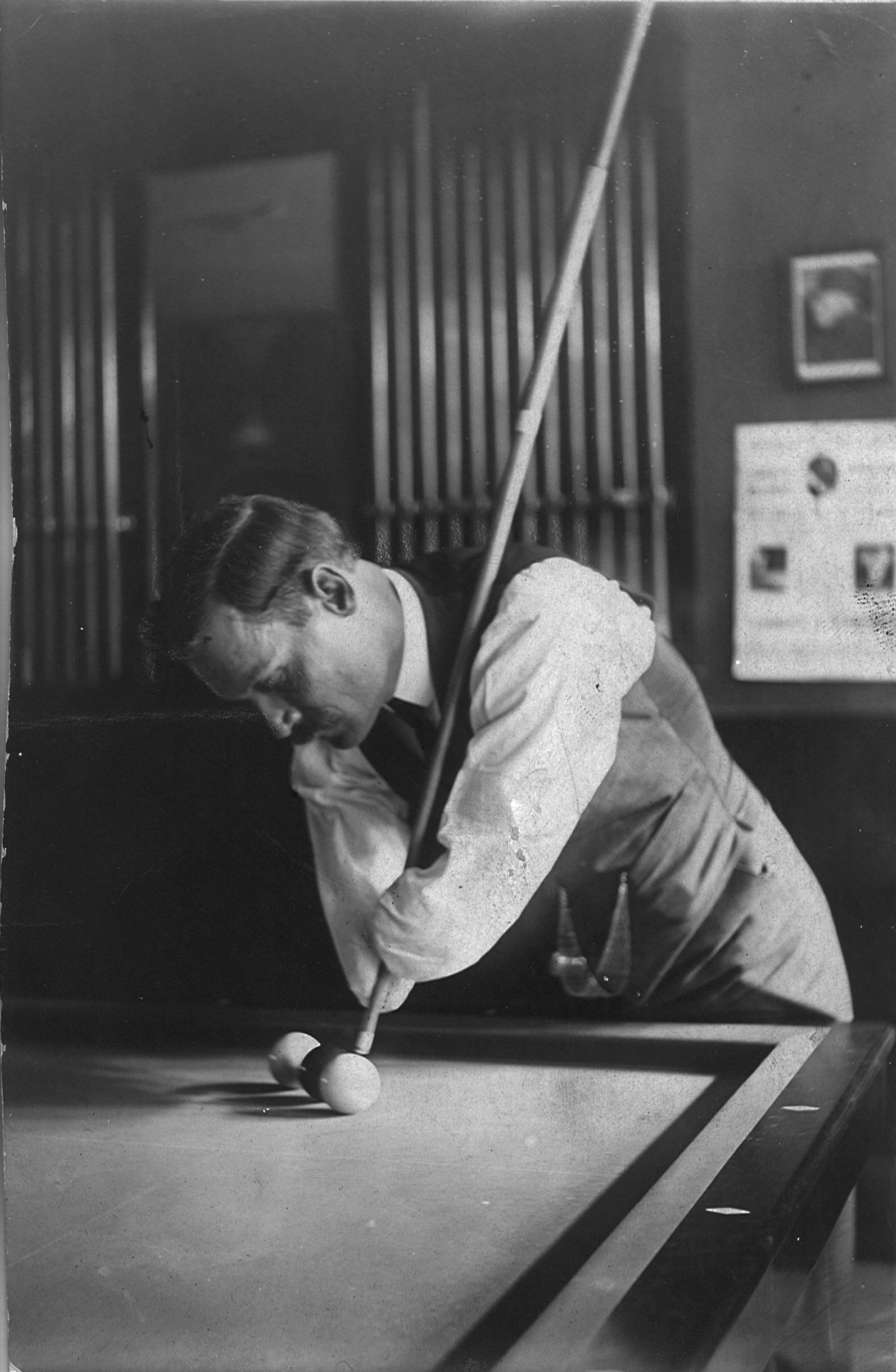
George H. Sutton "the Handless Wonder"
Who are these demigods, and why do they have such colorful nicknames: Buddy "the
Rifleman" Hall, Earl "the Pearl" Strickland, Mike "Captain Hook" Sigel, Efren "the Magician" Reyes, Johnny "the Scorpion" Archer, Billy "Cornbread
Red" Burge, Keith "Earthquake" McCready, "Saint Louie" Louie
Roberts, and of course Rudolph "Minnesota Fats" Wanderone?
Why do pool sharks get all the best nicknames? How did Minnesota Fats manage to
steal his nickname from a fictitious character ... then claim to
be him? Was that the
greatest hustle of all time?
If you think you can play pool with the great sharks, please consider what one of the best nine-ball players of all time, Luther "Wimpy" Lassiter,
said: "I watch a man shoot pool for an hour. If he misses more than one shot, I know I can beat
him."Think about it: If you miss more than one shot per hour, you're dead meat! That's how good the top pros are!
But let me begin with a stern warning: Don't gamble with her, or she'll "bust"
you ...
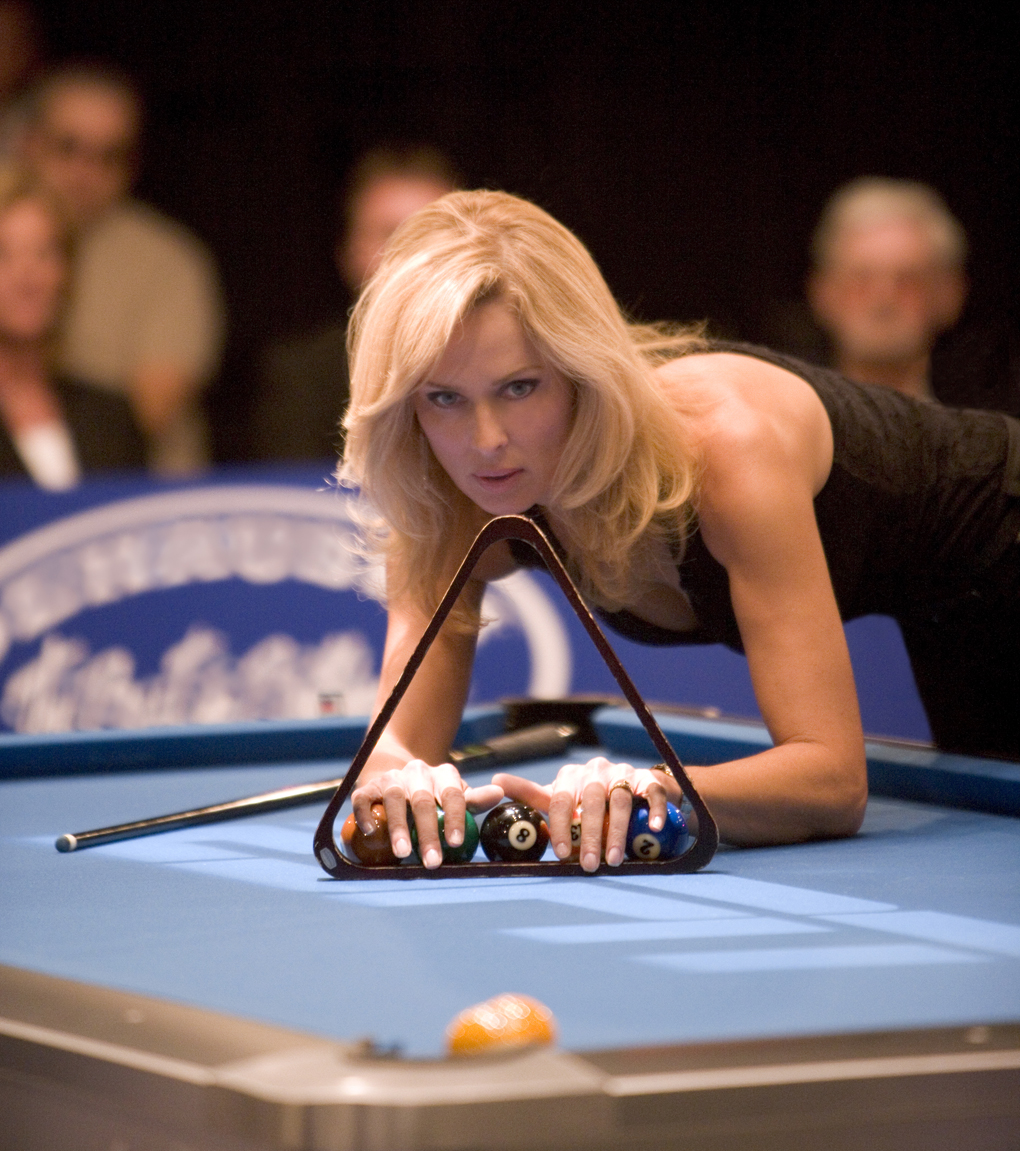
Her name is Ewa Mataya Laurance, nee Ewa Svensson, the "Striking Viking." She's a BCA
hall of fame pool player, and the wife of Jimmy "Pretty Boy Floyd" Mataya! And
do you really think you can outshoot this shark, with your eyes popping out of
your head? ...
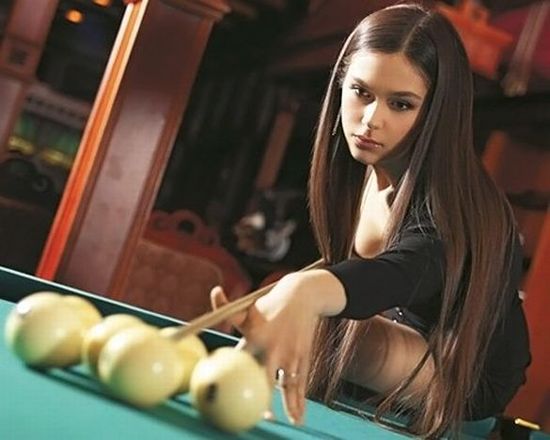
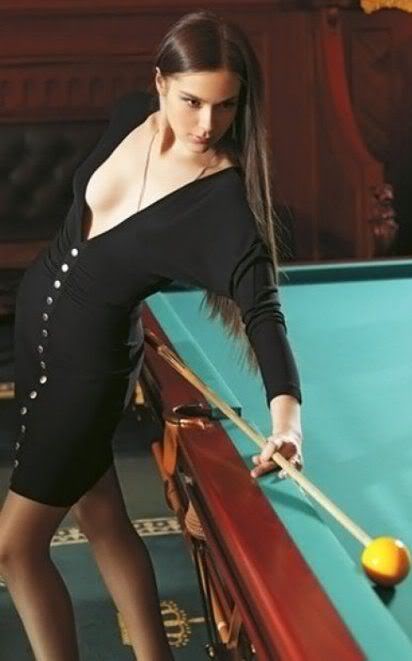
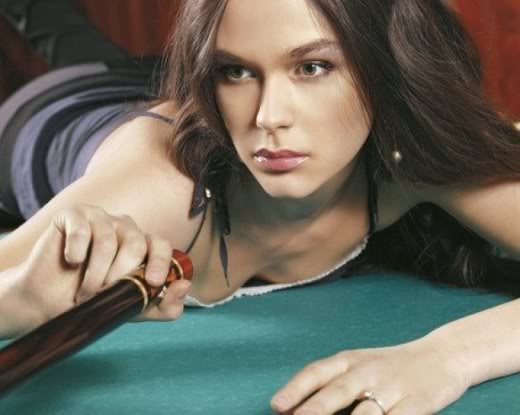
Her name is Anastasia Luppova. And don't even dream about playing any
of my top twenty pool
sharks of all time (below)!
How up on the game are you? Do you know the difference between
cushion billiards and pool? Have you heard of Harold Worst, and do you know why
many experts consider him to be the best pool/billiards player of all time,
despite the irony of his last name? Do you know why James Evans wasn't allowed
to play in pro tournaments, and yet still ended up spending the prize money? How did
Minnesota Fats rob Richie Florence, even though Florence was the
better
player? Which player scared the hell out of Luther Lassiter and Eddie Taylor
when they were considered the best nine-ball and one-pocket players on the
planet and he was still learning their games? Which all-time
nine-ball champion ran 11 consecutive racks to qualify for a million dollar
bonus, only to be ripped off by insurance company's bean-counters? How did Minnesota Fats become the
most famous pool player of all time when he never won a major tournament
and couldn't beat the best players head-up? Did Buddy Hall really spot top pros
the seven ball and take their backers' money, or is that just a myth? Who was the
greatest proposition gambler of all time: a man who
killed five of his victims without batting an eye
and even dared to hustle Al Capone? If you want to learn more about the fascinating games of billiards and pool, and
the sharks who rule such dangerous waters, you have landed on the right page ...
If you're looking for the colorful nicknames of your favorite pool
sharks, there is a VAST collection of pool nicknames at the
end of this page. To reach the nicknames quickly,
you can use CTRL-F to find them, or your browser's search function. To start at
the top of the nickname index, just search for "nickname index."
compiled
by Michael R. Burch
When I'm feeling a bit blue, I like to watch Ronnie O'Sullivan run a
perfect 147 without pausing to breathe, and that cheers me up. Pool is cheaper
than antidepressants although equally addictive! — Michael R. Burch
Related Pages: Was Minnesota Fats Overrated?,
Was Harold Worst the Best Pool Player Ever?,
A Brief History of Billiards,
Pool/Billiards Record High Runs,
The Sexiest Sharks,
Johnston City Sharks,
Nashville Sharks,
Dick Hunzicker,
"Saint Louie" Louie Roberts,
Earl "The Pearl" Strickland,
Who was the best nine-ball player?,
Famous Hustlers,
Famous Rogues,
Famous Forgers,
Famous Frauds,
Famous Flops,
Famous Hoaxes and Hucksters,
Famous Americans,
Famous Firsts,
Weird Sports Trivia
"The best game on earth." — Mark Twain, who may have been America's best writer and its most passionate billiards enthusiast!
That billiards is one of the oldest competitive sports
can easily be demonstrated. Billiards was being played outdoors in France in the 1300s,
as it appears in medieval art. Court
records show that King Louis XI of France purchased a billiard table in 1470. In 1587 Mary, Queen
of Scots, complained bitterly that her captors had deprived her of her table de billiard,
shortly before they deprived her of her head. Robert Dudley, the Earl of Leicester and a
favorite of Mary's nemesis, Queen Elizabeth I, also owned a billiard table. The
earliest known reference to a billiard table in a private residence is a 1588
inventory of Howard House, the London home of the Duke of Norfolk. It contained
a "billyard bord coered with a greene cloth three billyard sticks and 11 balls
of yvery." The first literary reference to "billiards" (then spelled
"balliards") appears in Edmund Spenser's
poem "Mother Hubberd’s Tale" in 1591. Another early reference to the game can be found in
Shakespeare's Anthony and Cleopatra, circa 1609, when Cleopatra tells her handmaiden:
"Let's to billiards!" — Shakespeare
Sounds like good advice to me. So "let's to billiards." These are my top twenty
pool players of all time, with a few ties ...
#20) Rudolph "Minnesota Fats" Wanderone (#1 at hustling, showmanship,
talking and "blarney")
#19) David Matlock (#1 on a bar table with a big cue
ball; great cue ball control; the "King of the Bar Box")
#18) Walter Lindrum (Australia's #1 player; he set 57 world records and raised
millions for charity)
#17) Jose "The Giant Killer" Parica (#1 at kicking;
great money player; has won more than 100 tournaments)
#16) Steve "The Miz" Mizerak (the affable John Madden of pool;
another wonderful ambassador of the game)
#15) Allen "Young Hoppe" Hopkins (a great
player despite his quirky stroke; also an excellent TV analyst)
#14) Vernon "Burnie" Elliot (the #1 "undercover" shark;
he would play
anyone for anything, anytime)
Don Willis (another legendary
undercover "monster" player; the #1 money nine-ball player of his era)
Don Hunzicker (Willie Mosconi cautioned friends not to tackle
this undercover "monster" at
straight pool)
#13) Leonard "Bugs" Rucker (especially strong at bank and one-pocket)
#12) Ronnie "Fast Eddie" Allen (#1 at power one-pocket, shooting with mop handles
and other crazy spots)
#11) Johnny "The Scorpion" Archer (great form; precision pool personified)
#10) Mike "Captain Hook" Sigel (#1 at safeties/defense as his nickname
suggests; won 100+ tournaments)
#9)
"Saint Louie"
Louie Roberts (#1 shotmaker; the Elvis of pool; charismatic showman and pool ambassador)
Keith "Earthquake" McCready (another great shotmaker, run-out artist
and colorful pool personality)
#8) Eddie "The Knoxville Bear" Taylor (#1 at bank and close to the top
at one-pocket)
John "Rags" Fitzpatrick (#1 at one-pocket
according to legends Eddie Taylor and Weenie Beenie Staton)
Raymond Ceulemans (#1 at three-cushion billiards
in the modern era with 24 world championships)
#7) Earl "The Pearl"
Strickland (#1 at run-out nine-ball; won five US Opens; McEnroe-like talent
and tantrums)
#6) Efren "The Magician" Reyes (#1 at rotation; strong at all
disciplines; the best overall modern-era player)
#5) Buddy "The Rifleman" Hall (#1 for long-term nine-ball greatness;
200 tournament wins;
spotted top pros)
#4) Alfredo de Oro (held world titles in three-cushion billiards and straight
pool, an impressive feat)
#3) Ralph "The Showman" Greenleaf (pool's first charismatic superstar;
the Babe Ruth of pool)
#2) Luther "Wimpy" Lassiter (he dominated the
Johnston City pool hustler tournaments even past his prime)
Willie "Mr. Pocket Billiards" Mosconi (#1
ball runner; the king
of straight pool when straight pool was king)
Willie "The King" Hoppe (#1 at three-cushion
billiards; won 51 world titles; held the high run for 50 years!)
James Evans (banned from tournaments
due to segregation, he'd play the
winners and take the prize money!)
Albert "Peter Pan" Frey (America's first pool shark dominated
continuous/straight
pool and pyramid/eight-ball)
Ronnie "the Rocket" O'Sullivan (#1 at snooker
with 15 perfect 147s and 1,000+
century breaks)
#1) Harold "the Best" Worst (Luther Lassiter and
Eddie Taylor dodged him; Ronnie Allen begged him for spots and idolized him as a
result; other top pros demanded mortal
locks; but still "everybody that played Worst shook!")
HIGH HONORABLE MENTION: Francisco "Django" Bustamante, Irving Crane aka "The
Deacon,"
Allison Fisher aka "The Duchess of Doom," Kelly Fisher aka "Kwikfire,"
Thorsten Hohmann aka "The Hitman," Mika Immonen
aka "The Ice Man," "Cowboy Jimmy Moore," Jimmy Rempe aka "The King,"
Ralf Souquet aka "The Kaiser," Nick Varner aka "Kentucky Colonel"
BEST ACTIVE POOL PLAYERS:
Fedor Gorst aka "The Russian Robot" and "The Ghost" was the
top-ranked pool player in 2024, David Alcaide aka "El Matador," Ameer Ali, Carlo
Biado aka "The Black Tiger," Shane Van Boening aka the "South Dakota Kid,"
Robbie Capito, Johann Chua, Ko Ping Chung aka "King Killer," Mike Dechaine,
Niels Feijen aka "The Terminator," Joshua Filler aka "Killer," Dennis Grabe,
Jeffrey Ignacio, Eklent Kaci aka the "Albanian Eagle," Alexander Kazakis, Pin-Yi
Ko, Chris Melling, Dennis Orcollo, Albin Ouschan, Jasmin Ouschan, Alex Pagulayan
aka the "Lion," Francisco Sanchez Ruiz, Jayson Shaw aka "Eagle Eye," Billy
Thorpe aka "Thorpedo," Kristina Tkach, Judd Trump, Skyler Woodward
While I believe Harold "the Best" Worst was the best pool/billiards player of
all time, I think Albert "Peter Pan" Frey deserves special mention. Before
Albert Frey, playing "shape" or cue ball position was unknown. As games in which
balls had to be pocketed became more popular, cue ball position suddenly became
of prime importance. Frey was the first pool shark to play "shape" in
new-fangled games like 61-pool, 15-ball, continuous pool (the forerunner of straight pool) and
pyramid (the forerunner of eight-ball). And while nine-ball did not exist at the
time, it is essentially a watered-down version of fifteen-ball, which Frey also
dominated in the early days. Anyone who dominates at fifteen-ball would be even
better at nine-ball. Frey was also the first player to "shark" other players by
rolling out to "impossible shots" which he would then make. This would become a
tactic employed by sharks to come such as Keith McCready, Louie Roberts and Harold
Worst. Albert Frey was the first American pool shark, a real original. So let's
give credit where credit is due. [BTW, I came up with the nickname "Peter Pan"
for Albert Frey after seeing his image on a playing card.―MRB]
THE BEST NINE-BALL PLAYERS
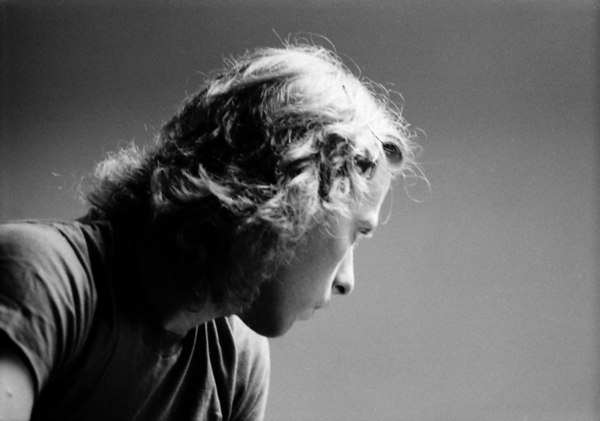
The picture above is of Earl "The Pearl" Strickland, at the 1982 Dayton
Nine-ball Open.
The best nine-ball players: (#10) Don Willis aka "The Cincinnati Kid" (#9) Johnny Archer
aka "The Scorpion" (#8) Efren Reyes aka "Bata" and "The
Magician" (#7) Nick Varner aka "Kentucky
Colonel" (#6) Mike Sigel aka "Captain Hook" and "Mike the Mouth" (#5) Keith McCready
aka "Earthquake"
(#4) "St. Louie" Louie Roberts (#3) Luther Lassiter aka "Wimpy" (#2) Earl
Strickland aka "The Pearl" (#1) Buddy Hall aka "The Rifleman"
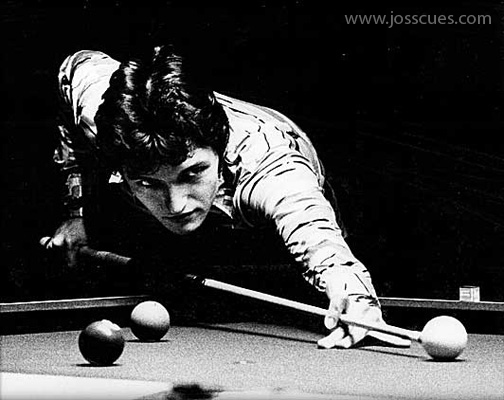
"St. Louie" Louie Roberts
The best nine-ball players honorable mention: Ronato "Volcano" Alcano, Darren
"Dynamite" Appleton, Justin "Ice" Bergman aka "IceBerg," Carlo Biado, Shane
Van Boening aka "The South Dakota Kid," Francisco "Django" Bustamante, Fong-Pang Chao, Kuo Po-Cheng,
Corey "Cash Money" Deuel, Vernon Elliott, Niels Feijen aka "The Terminator," Joshua Filler
aka "Killer," Richie Florence, Fedor Gorst aka "The Russian
Robot" and "The Ghost," Dennis Hatch aka "Hatchetman," Allen Hopkins
aka "Young Hoppe" (because he was a protégé of the great Willie Hoppe), Mika Immonen
aka "The Ice Man," Eklent Kaci aka the "Albanian Eagle," Larry Lisciotti aka "The Prince of Pool," Dave Matlock, Chris Melling
aka "The Magician," Rodney "The Rocket" Morris, Dennis Orcollo aka "Robocop,"
Oliver Ortmann, Albin Ouschan, Alex Pagulayan aka "The Lion," Jose Parica aka
"The Giant Killer," Ko Pin-yi, Tony Robles aka "The Silent Assassin," "Mexican"
Ron Rosas, Francisco Sanchez Ruiz aka "The Spanish Sensation," Jayson
Shaw aka "Eagle Eye," Sammy Soto, Ralf Souquet aka "The Kaiser" Evgeny Stalev, Billy
"Thorpedo" Thorpe, Skyler Woodward
,
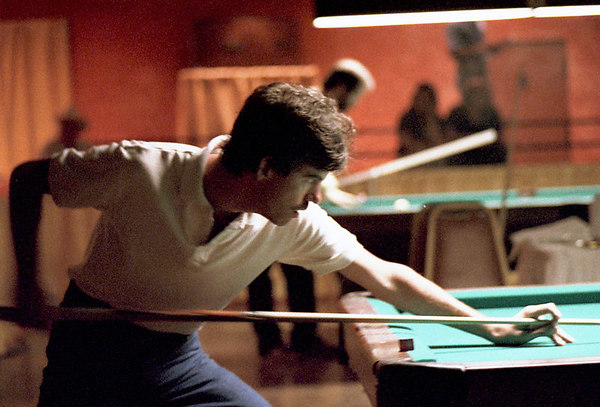
Keith "Earthquake" McCready at the 1984 River City Open
Nine-ball Tournament (photo by Mike Haines; photo editing by Bill Porter). I used
to watch McCready play golf on a snooker table at Scott Amusement
Center in
Nashville. He wasn't acting in The Color of Money ... as Grady
Seasons, he was just playing himself, to a T. When I saw him play, he
would eye a really difficult shot, say something outrageous like "God couldn't
make that ball," then pocket it.
He once ran nine straight racks of nine-ball, to come from behind and
defeat Larry "The Iceman" Hubbart 11-6 in the Sacramento Open
Nine-Ball Championship, and
I believe he has confirmed that he once ran 21 racks of nine-ball in
three consecutive races to 7, on a bar table.
The best one-shot roll-out nine-ball players: Eddie Taylor (because of his
superior banking ability) and Harold Worst (because of his superior cutting
ability)
According to Luther Lassiter, George Rood and Garten Bierbower, Don Willis was
the best nine-ball player of all time. Lassiter and Willis teamed up to form
"arguably the most formidable road team in American history." According to Scot
Lee, there was an open challenge for anyone to play Willis for $25,000 in his
hometown of Canton, and it went unanswered for 25 years. Willis was famous for
"lucking in" money balls that he made on purpose and for making "wing shots"
with the object ball rolling. Willis was also a proposition gambler and a top
poker, gin rummy, dice, checkers, chess, marbles, table tennis and horseshoe
player.
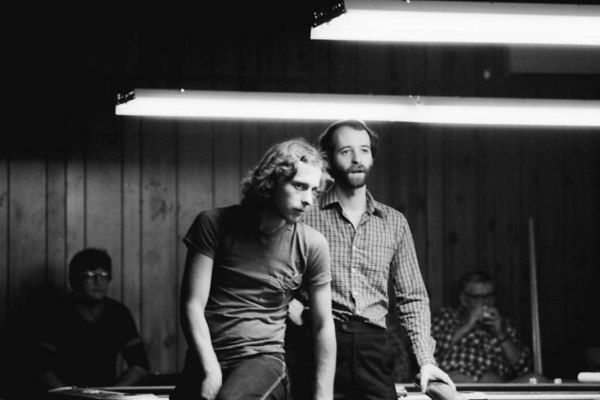
Earl "The Pearl" Strickland and Mike "Captain Hook" Sigel looking intense at the
1982 Dayton Nine-ball Open.
THE BEST STRAIGHT POOL PLAYERS
Ralph Greenleaf, sometimes called the "Aristocrat of Billiards," was a
twenty-time World Pocket Billiards champion who shared sports page top billing
with Babe Ruth, Jack Dempsey and Red Grange. A glamorous playboy, Greenleaf was
one of the most romantic figures of the Roaring Twenties. His wife, the former
Amelia Ruth Parker, was a flapper (vaudeville actress) who performed as
"Princess Nai Tai" and "The Oriental Thrush." I have also seen her called "The
Oriental Nightingale." In The Bank Shot and Other Great Robberies,
Minnesota Fats described her as "exquisite beyond belief" and said that
Greenleaf was so handsome he made Rock Hudson look like Quasimodo! When
Greenleaf was not competing, he toured with his wife, performing trick
shots and demonstrations. Here is how a New York Times article
describes their performances and lifestyle: "It was some kind of act. Greenleaf,
in a form-fitting tuxedo, performed trick shots under suspended mirrors that
picked up the dazzling movement of the billiard balls and sent it out to the
audience, a la satellite, as the princess, in a stunning, ankle-length white
ermine coat, narrated the action. The Greenleafs, with an income in six figures,
lived in penthouses and hotel suites in those plush, carefree days ..."
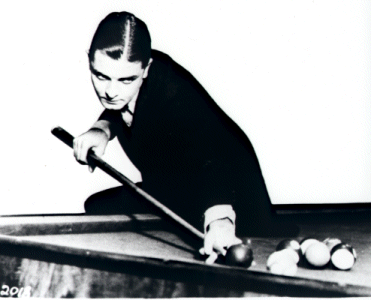
Ralph Greenleaf lines up a shot.
The best straight pool players: (#10) Allen Hopkins aka "Young Hoppe" (#9)
Thorsten Hohmann aka "The Hitman" (#8) Jimmy Rempe aka "The King" (#7) Steve
Mizerak aka "The Miz" (#6) Nick Varner aka "Kentucky Colonel" (#5) Mike Sigel
aka "Captain Hook" (#4) Luther Lassiter aka "Wimpy" (#3) Irving Crane aka "The
Deacon" (#2) Ralph Greenleaf aka "The Showman" (#1) Willie Mosconi aka "Mr.
Pool"
The best straight pool players honorable mention: Joe "The Meatman" Balsis, "Machine Gun" Lou Butera, Jimmy Caras,
Thomas Engert, Michael Eufemia, Johnny "Irish" Lineen, Larry Lisciotti
aka "The Prince of Pool," Peter Margo, Ray "Cool Cat" Martin,
"Cowboy" Jimmy Moore, James "Cisero" Murphy, Gene Nagy, John Schmidt
aka "Mr. 626," Frank
"The Inexorable Snail" Taberski, Dallas West
Larry Lisciotti was called "The Prince of Pool" and
after Jimmy Moore finished second in a number of major tournaments he was called
"The Underpaid Prince of Pool" and "Pool's Underpaid Prince"!
John Schmidt was called "Mr. 400" after straight pool runs of 400 and 403 balls.
Then he decided to get really serious about straight pool and
began training to break Willie Mosconi's seemingly insurmountable high run of
526 ball. Schmidt finally broke the record with a high run of 626 balls, so he
is now either "Mr. 626" or "Mr. 600" depending on whether one rounds, or doesn't.
However, Mosconi dominated professional tournaments against the best players
in the world, so I still consider him the top dog.
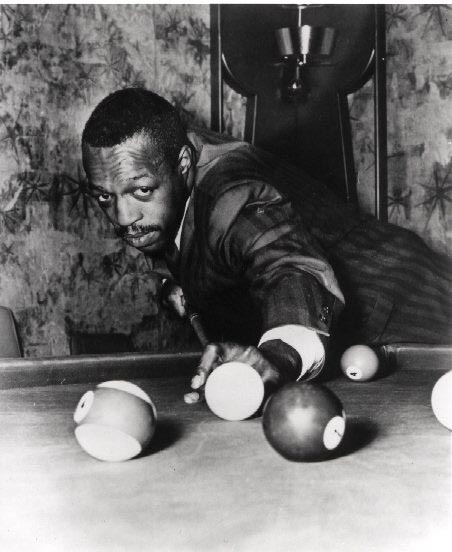
James "Cisero" Murphy was the first African-American professional pool
player to win national and international titles. Murphy was inducted
into the BCA Hall of Fame in 1995. He is the only player in the history of pocket
billiards competition to win a world title on his first attempt.
THE BEST SHOWMEN AND SHOWGIRLS
The best showmen: Ralph "The Showman" Greenleaf, Jimmy "Pretty Boy Floyd" Mataya,
Utley Jim "U.J." Puckett, "St. Louie" Louie Roberts, Rudolf
"Minnesota Fats" Wanderone
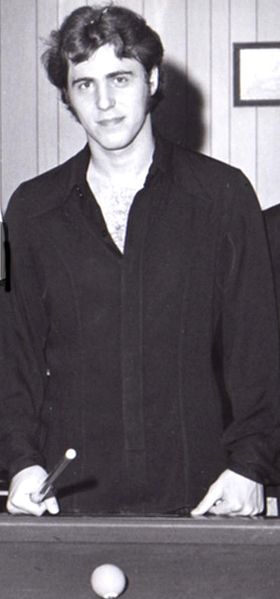
Jim Mataya, also known as "Pretty Boy Floyd," formed pool's first "power couple"
when he married the "Striking Viking" Ewa Svensson, in 2004. They helped
bring some much-needed glamour to the often-seedy sport of pocket billiards.
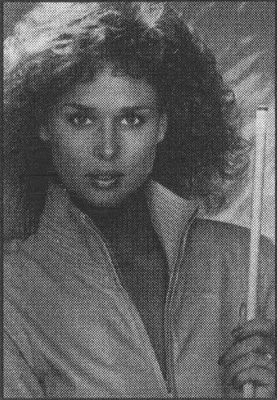
Ewa Mataya, "The Striking Viking"
THE BEST FEMALE PLAYERS
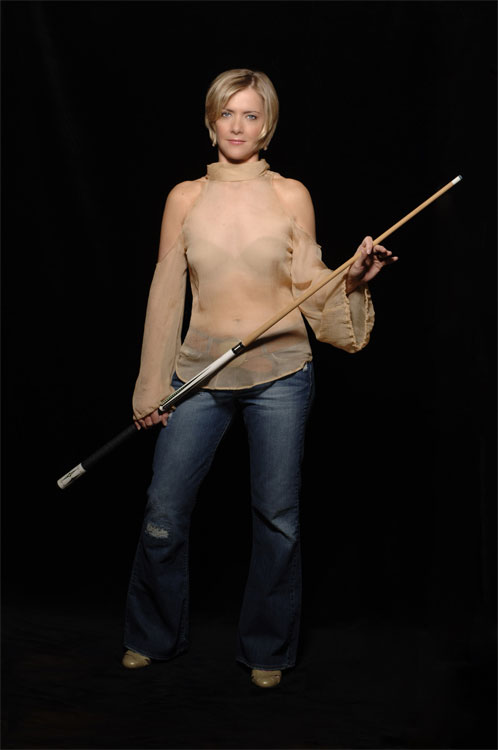
Allison Fisher, "The Duchess of Doom"
The first female superstar of pool was Ruth McGinnis. According to newspaper
reports, she beat Ralph Greenleaf twice. From 1933 to 1939, McGinnis only lost
29 out of 1,532 matches, a winning percentage of .976. She had a high run of
128. Reporters called her Susie Cue and the Queen of Billiards.
The Women's Professional Billiard Alliance (WPBA) was established in 1976 and is
the oldest pro player organization in the sport. The WPBA sanctions and produces
the Women's Pro Billiard Tour, which features ESPN-televised events between the
world's greatest women players.
The best early WPBA tour players: Dorothy Wise (she won the first five BCA
straight pool titles), Jean Balukas (she won the next four), Loree Jon Ogonowski
aka Loree Jon Jones (she won the next two), Robin "Bankroll" Bell aka Robin
Dodson, Belinda Campos, Vicki Paski aka Vicki Frechen, Ewa "The Striking Viking" Mataya Laurance, Lori Shampo,
Gloria Walker
The best women that I have seen personally: Allison Fisher aka "The Duchess of
Doom," Jeanette Lee aka "The Black Widow," Jasmin Ouschan aka "Jassy,"
Vivian Villarreal aka "The Texas Tornado," Karen Corr
Other notable female pool players: Michelle Adams, Christina Alexander, Bonnie
Arnold, Rubilen Amit, Borana Andoni aka "Killer B," Mary Avina
aka "The Red Angel," Jennifer Barretta, Belinda Bearden, Nikki Bennish, Brittany Bryant, Tammy Cantoni, "Little
Lightning" Yu Ram Cha, Jennifer Chen, Chezka Centeno, Diane Crane, Fran
Crimi, Emily Duddy, Kelly Fisher, Liz Ford, Christina de la Garza, Mary Guarino, Olga Gashkova, Gail Glazebrook, Gerda
Hofstaetter, Kerry Hartsfield, Dawn Hopkins, Lynette Horsburgh, Huang Hsin, Veronika Hubrtova, Wendy Jans, Ina Jentschura,
Ho Hsin Ju, Mary Kenniston, Ga-Young Kim
aka "the Little Devil Girl,"
Line Kjorsvik, Peg Ledman, Michelle Li, Yun-Mi
Lim, Melissa Little, Shanelle Loraine,
Anastasia Luppova, Linda McWhirt, Diana Mironova, Tiffany Nelson, Susie
O'Connor, Nesli O'Hara, Kelly Oyama, Angelina
"Angel" Paglia, Xiaoting Pan, Aileen Pippin, Liu Shasha, Nataliya Seroshtan, Kim Shaw,
Laura Smith, Fraziska
Stark, Shari Stauch, Darlene Stinson, Helena Thornfeldt, Patricia Tipton, Dora
Valdez, Monica Webb,
Pan Xiaoting aka "The Queen of Nine Ball,"
Chou Chieh Yu, Han Yu, Cha Yu-Ram
Jeanette Lee, "The Black Widow"
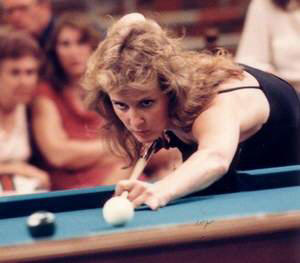
Vicki "Diamond Vic" Frechen (now Vicki Paski) was a top ten WPBA player during the 1980s,
rising as high as number two in 1981. She was the Pool & Billiard Magazine
player of the year in 1982. She is also a member of the WPBA Hall of Fame. In 1985
she was elected vice president of the WPBA. In 1987 she became ESPN's first
female billiards analyst. In 1991 she was elected president of the WPBA.
Jean Balukas, one of pool's first female superstars, was already a billiards
expert at age six!
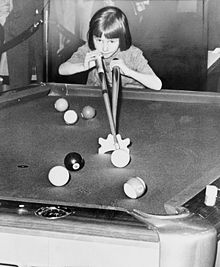
THE BEST EIGHT-BALL PLAYERS
The best eight-ball players: (#10) Thorsten Hohmann aka "The Hitman" (#9) Darren Appleton
aka "Dynamite" (#8) Johnny Archer (#7) Shane Van Boening (#6) Rodney Morris (#5) Alex
Pagulayan (#4) Ralf Souquet (#3) Nick Varner (#2) Mike Sigel (#1) Efren Reyes
The best eight-ball players honorable mention: Ronato Alcano, Justin Bergman,
Carlo Biado, Karl Boyes, Ko Ping Chung, Lee Vann Corteza, Corey Deuel, Mick
Hill, Chang Jun Lin, Chris Melling, Dennis Orcollo, Oliver Ortmann, Albin
Ouschan, Daryl Peach, Jayson Shaw
THE BEST TEN-BALL PLAYERS
The best ten-ball players: (#10) "Hippie" Jimmy Reid (#9) Alex Pagulayan aka
"The Lion" (#8) Eddie Beauchene aka "Detroit Whitey" (#7) Tony Drago (#6) Shane
Van Boening (#5) Efren Reyes (#4) Buddy Hall (#3) Mika Immonen aka "The Ice Man"
(#2) Dennis Orcollo aka "RoboCop" (#1) Johnny Archer
According to George Fels, Detroit Whitey once ran ten consecutive racks of
ten-ball, "achieved in a six-handed $50 ring game."
Johnny "The Scorpion" Archer has won more than 60 professional tournaments and
was voted the best player of the 1990s by Billiard Digest. He has won
the world ten-ball championship a record four times.
THE BEST ONE-POCKET PLAYERS
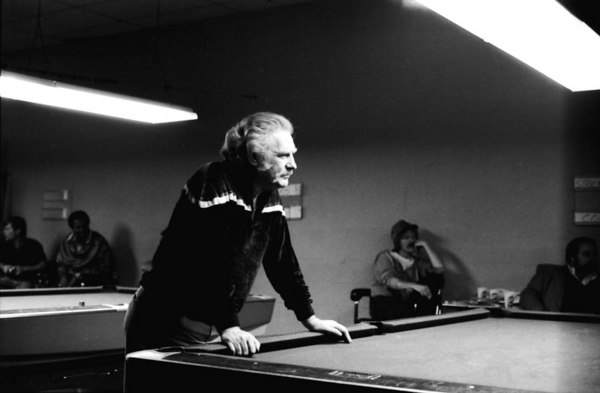
Billy Joe Burge aka "Cornbread Red," circa 1982. Several of the black-and-white
pictures on this page were taken at the 1982 Dayton Nine Ball Open, at Forest
Park Billiards in Dayton, Ohio. The billiard hall was owned by Joe Burns at
that time. These striking photos were taken by Mike Haines; the photo editing was done by
Bill Porter. My thanks to them for their excellent (and artistic) work.
The best one-pocket players:
(#10) Dennis Orcollo
(#9) Larry Johnson aka "Boston Shorty"
(#8) Jack Breit aka "Jersey Red" (#7) Grady Matthews aka "The Professor" (#6)
Billy Burge aka "Cornbread Red" (#5) Nick Varner aka "Kentucky Colonel"
(#4) Efren Reyes aka "The Magician"
(#3) Eddie Taylor aka the "Knoxville Bear"
(#2) John Fitzpatrick aka "Rags"
(#1) Ronnie Allen aka "Fast Eddie"
How good was Vernon "Burnie" Elliot at one-pocket? No one really knows, because
he refused to play in tournaments. He preferred to hustle and didn't want his
name in the limelight. But he was known for making proposition bets on
"impossible shots," including crazy banks, then pulling them off. So my hunch is
that he belongs somewhere in the top ten ... perhaps even at the top, since he
once beat Ronnie Allen out of 10K.
One-pocket honorable mentions: Darren Appleton, Arthur "Artie" Bodendorfer, Dave
Bollman, Shane van Boening, Melvin "Strawberry" Brooks, Francisco Bustamante, Marcel Camp,
Mike Carella, Marshall
"Tuscaloosa Squirrel" Carpenter, Tony Chohan, Steve
"Cookie Monster" Cook,
Hubert "Daddy Warbucks" Cokes, Chip Compton, Jack Cooney,
Shannon "The Cannon" Daulton, Don Decoy, Corey Deuel, Danny
DiLiberto, Vernon "Burnie" Elliot, Johnny Ervolino,
Scott "Freezer" Frost, Jimmy "The Philadelphia Flash" Fusco, David Grossman, Buddy "The Rifleman" Hall,
Justin Hall, "Marvelous" Marvin Henderson, Allen
Hopkins, Bill Incardona, Jeremy Jones, Cliff "Spotmaster" Joyner, "Champagne" Ed Kelly,
Hayden Lingo, Larry Lisciotti aka "The Prince of Pool," Eugene "Clem" Metz, "San Jose" Dick McMorran,
Gabe "The Babe" Owen, Alex Pagulayan, Jose "Amang" Parica, U. J. Puckett, Kenny "Romberg" Remus, Bob "Big Nose" Roberts,
"Monster John" Rouse, Leonard "Bugs" Rucker, Earl Schriver,
Brandon Shuff, Danny Smith, Gary Spaeth, Joey Spaeth, Jimmy
"Flyboy" Spears, Bill "Weenie Beenie" Staton, Bill Stroud, Billy Thorpe, Cecil "The Left Duke" Tugwell,
Johnny Vives, Rudolf "Minnesota Fats" Wanderone,
Don Willis, Glen "Eufaula Kid" Womack,
Harold Worst
In his prime Ronnie Allen was spotting top pros at one-pocket.
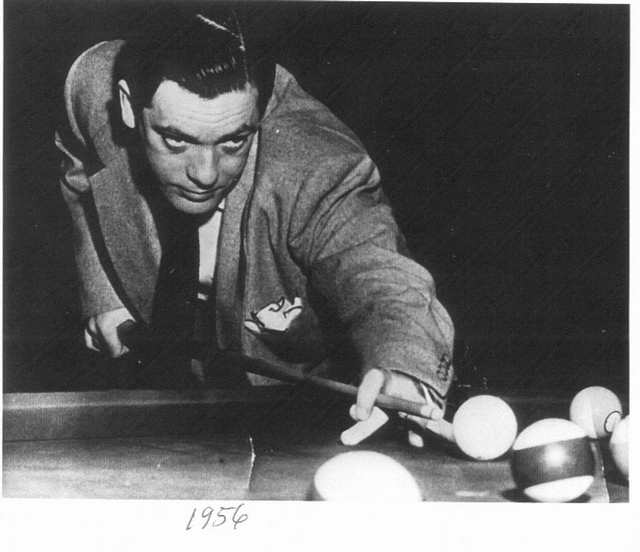
John Joseph "Rags" Fitzpatrick looking wonderfully dapper above; his nickname
was obviously ironic.
THE BEST BANK PLAYERS
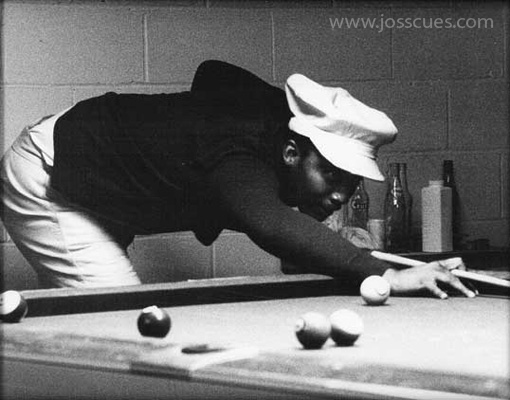
Leonard "Bugs" Rucker, circa 1982.
John Brumback has a LOT of support as the best bank player of all time. Other
names frequently mentioned as the best banker of all time include Eddie Taylor, "Bugs"
Rucker, Nick Varner, Efren Reyes and Truman Hogue.
The best bank players: Donnie "The Cincinnati Kid" Anderson, Bucky
Bell, Freddy "The Beard" Bentivegna, Shane Van Boening, John Brumback, Billy "Cornbread Red" Burge, Marcel Camp, Johnny "Cannonball" Chapman,
Clyde Childress, Tony Coleman, Wade "Boom Boom" Crane, Tony "Banks" Coleman,
Shannon "The Cannon" Daulton, Louis Demarco, Vernon "Burnie" Elliot, Tony "Fargo" Ferguson,
Scott Frost, Jimmy "The Philadelphia Flash" Fusco,
Cris Gentile, Brian Gregg, Buddy "The Rifleman" Hall, Justin Hall, Truman Hogue, Mark Jarvis,
Jeremy Jones, Cliff Joyner, Jason Miller, John Morra, Shannon Murphy, Alex
Pagulayan, John Pinegar, Larry "The
Turtle" Price, Kenny "Romburg" Remus, Efren Reyes, Glen "Piggy Banks" Rogers, Leonard "Bugs" Rucker,
Ike Runnels, Gary Spaeth,
Eddie "The Knoxville Bear" Taylor, Cheyenne Pete Trujillo, Nick Varner, "Mexican" Johnny
Vasquez aka "Big Head," Javenly "Youngblood" Washington
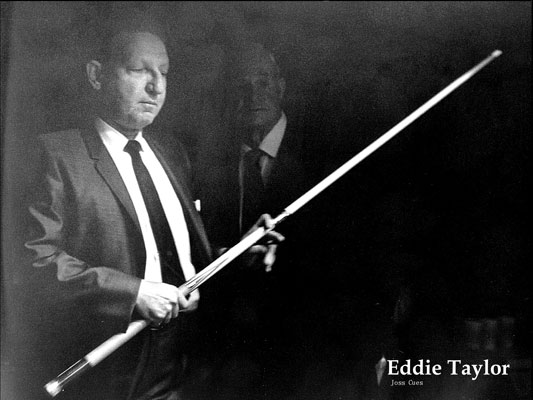
Eddie "The Knoxville Bear" Taylor is considered by many "players in
the know" to have been the best bank player of all time, and
unsurprisingly, one of the best one-pocket players as well.
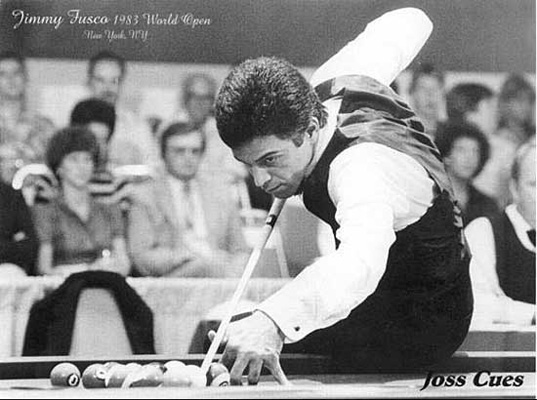
Jimmy Fusco aka "The Philadelphia Flash" was one of the best bankers of the modern
era, and the
cousin of another well-regarded player, Pete Fusco.
THE BEST ALL-ROUND PLAYERS
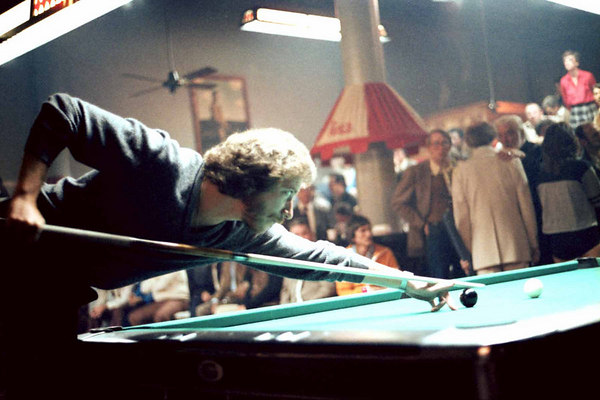
Jim "King James" Rempe won more than 100 tournaments, with multiple major
championships in all the major disciplines
The best all-round players (good at everything): (#10) Eddie Taylor (#9) Jim
Rempe aka "King James" (#8) Earl Strickland (#7) Buddy Hall (#6) Mike Sigel (#5) Nick Varner
(#4) Alfredo de Oro (#3) Luther Lassiter (#2) Efren Reyes (#1) Howard Worst
While fans of Efren Reyes will no doubt disagree, I think the fact that Harold
Worst was a world champion at three-cushion billiards, won a snooker tournament
in England shortly before his death, and won world championships in other
disciplines while dying with brain cancer, makes him number one overall.
THE BEST SHOTMAKERS, GAMBLERS, ROAD PLAYERS, HUSTLERS, INTIMIDATORS,
ETC.
The best shotmakers and thin cutters: Kim Davenport, Keith "Earthquake"
McCready, Danny Medina, "St. Louie" Louie Roberts, Earl "The Pearl"
Strickland,
Harold Worst
The most intimidating pool sharks of all time: Buddy "The Rifleman" Hall, "Titanic"
Thompson
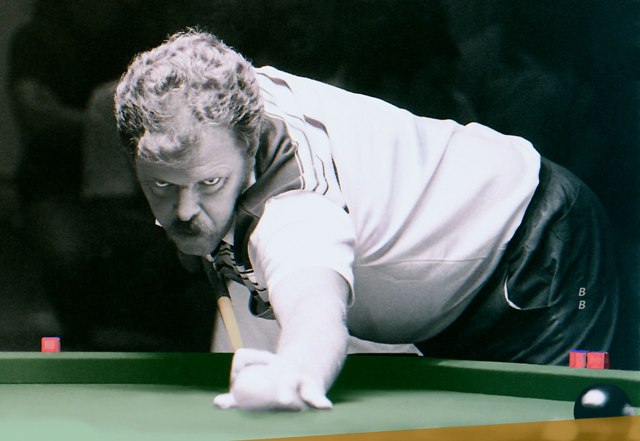
The photo above is of Buddy "The Rifleman" Hall taken in
1986 by Billie Billing. Hall, the picture of intensity, seldom looked happy at a pool table, even when he
was winning in a cakewalk.
"Until you've received a spanking from Mr. Buddy Hall, you don't
know what perfect pool is about." — Alfie Taylor
"Titanic" Thompson, aka Alvin Clarence Thomas, earned his nickname because when
it came to gambling, he was always sinking his opponents, whether at billiards,
golf, dice, horseshoes, cards, or various other "propositions." He allegedly
killed five men ... each of whom, according to him, would have admitted they got
what they deserved! Minnesota Fats called him "the greatest action man of all
time." Ben Hogan said that he was the best golf shotmaker he ever saw. When
asked if he would become a golf professional, Titanic Thompson demurred,
claiming that he couldn't afford the pay cut!
Here's an interesting story about proposition gambling, as told by Eddie Taylor:
"One time with Titanic Thompson―I'm sure you've heard of him―well Ti was in town
and he saw me playing a guy that was a bookmaker playing for four hundred
dollars a game, playing him 8-5 one pocket and I was playing one-handed with no
tip on my cue. Now what happened was, I drew the ball about 6-7 inches with no
tip, one-handed. So he said 'They'll be no more of that' and he got a glass of
water and I had to dip the stick in the water each time before I shot, but I
still beat him out of four thousand. Well Titanic saw that and said, 'That was
the most amazing thing I've ever seen in my life!'"
The best road players and hustlers: Ronnie "Fast Eddie" Allen, Danny "Kid Delicious" Basavich, Billy
"Cornbread Red" Burge, Leonard "Bugs" Rucker, Vernon "Burnie"
Elliot, Minnesota Fats,
John "Rags"
Fitzpatrick, Richard "Little Richie" Florence, Keith McCready, "St. Louie" Louie Roberts
The best money players of all time, when the cash was on the line: Ronnie "Fast Eddie" Allen,
Johnny Archer, Jack "Jersey Red" Breit, Billy "Cornbread
Red" Burge, Fernando Bustamante aka "Busty,"
"Jew" Paul Brusloff, Clyde Childress, Jack Cooney, Corey "Cash Money" Deuel, Vernon "Burnie" Elliot,
John
"Rags" Fitzpatrick, "LA" Richie Florence, "Pretty Boy"
Floyd, Jimmy Garza, Danny Grossman, Buddy "The Rifleman" Hall,
Luther "Wimpy" Lassiter, Keith "Earthquake"
McCready, Alex Pagulayan, Jose "The Giant Killer" Parica, Efren "the Magician" Reyes, Leonard "Bugs" Rucker,
Alvin "Titanic" Thompson,
Kenny "Romberg" Remus,
"Saint Louie" Louie Roberts,
Denny Searcy, Jimmy "Flyboy" Spears, Sonny Springer, Earl Strickland, Eddie "The Knoxville Bear"
Taylor, Rudolph "Minnesota Fats" Wanderone,
Don Willis, Harold Worst (was Worst the best money player ever?)
The best natural talents and "boy/girl wonders": Jean Balukas, Johnny Cannila, Dennis
Hatch, Allen "Young Hoppe" Hopkins, Bobby Logan, Earl Strickland, Harold Worst
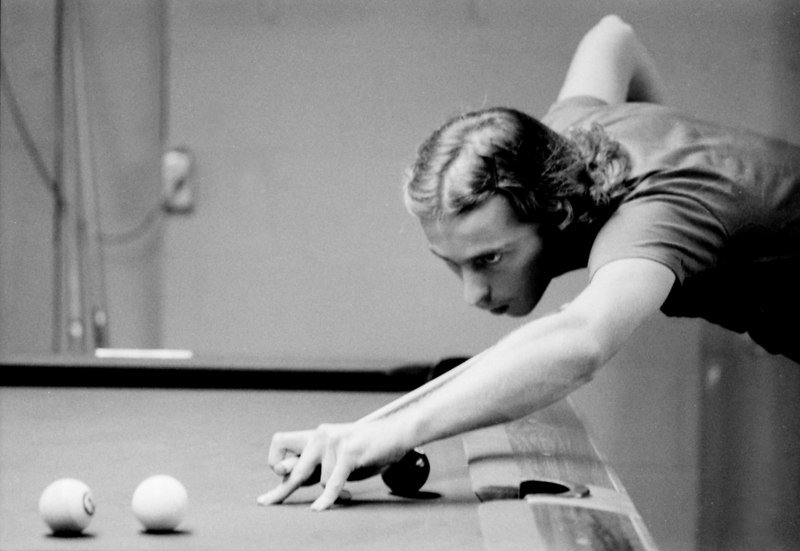
I first saw Earl Strickland at the Music City Nine-Ball Open,
held at the ritzy Nashville Maxwell House Hotel, circa 1982-1983. The Pearl had bobby pins holding back his long, flowing mane, and he
was giving Buddy Hall serious grief with his amazing jump shots and spectacular shotmaking.
When in Nashville, if I remember correctly, the Pearl spotted all comers the
seven ball. If he ever lost money giving up the seven in
Nashville, I never heard about it. I believe Mike Sigel won the Music City Open
in 1982, and Ray "Cool Cat" Martin won in 1983, coming out of the losers' bracket to defeat
Larry Hubbart. But the player I remember best is Earl the Pearl, resplendent in
bobby pins, jumping balls before it was in fashion, and running out like a
madman.
DYNAMIC DUOS
Luther "Wimpy" Lassiter and Don "Cincinnati Kid" Willis
"Cowboy" Jimmy Moore and Don "Cincinnati Kid" Willis
Luther "Wimpy" Lassiter and Rudolf "Minnesota Fats" Wanderone
Alvin "Titanic" Thompson and Rudolf "Minnesota Fats" Wanderone
Eddie "Knoxville Bear" Taylor and John "Rags" Fitzpatrick
Ewa "The Striking Viking" Mataya and Jimmy "Pretty Boy Floyd" Mataya
TRICK SHOT ARTISTS
The best trick shot artists: Chef Anton, Paul Gerni, Mike "Tennessee Tarzan" Massey,
Stefano Pelinga, Tom Rossman, Andy Segal, Ron Dooley
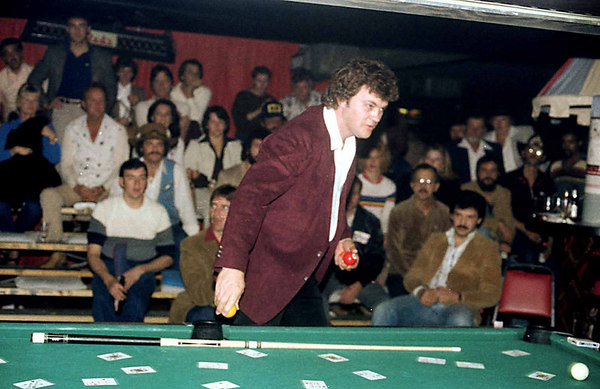
Mike "Tennessee Tarzan" Massey (circa 1983-1984 photo by Mike Haines/Bill
Porter)
The best rotation players: Larry "Boston Shorty" Johnson, George "Rotation Slim"
Hairston, Wu Jia-quing, Carlo Biado, Francisco Bustamante, Dennis Orcollo,
Ronnie Alcano, Efren Reyes
Some of the best "young guns" include Justin Bergman, Carlo Biado, Siming
Chen, Joshua Filler, Jeffrey Ignacio, Eklent Kaci, Jason Klatt, John Morra, Albin Ouschan, "Eagle Eye" Jayson Shaw,
Billy Thorpe, Judd
"Stud" Trump, Tony Watson, Shane Winters, Skyler Woodward, Johann
Chua, Zhou Long and Ko Pin
Yi.
The best players you probably never heard of (unless you really follow
pool) include Ronnie "Volcano" Alcano, Darren Appleton, Tony Chohan, Mike
Dechaine, Ron Dooley, Niels Feijen, Thorsten "the Hitman" Hohman, Raj Hundal,
Markus Juva, Warren Kiamco, Daryl Peach, Ray "Dracula" Reardon, John Schmidt,
John "Omaha" Shuput and Ralf Souquet.
The best tournament players: Johnny "The Scorpion" Archer, Ralph "The Showman" Greenleaf, Buddy "The
Rifleman" Hall, Allen "Young Hoppe" Hopkins, Luther "Wimpy" Lassiter, Willie Mosconi, Steve "The Miz" Mizerak,
Jim "King James" Rempe, Efren "The Magician" Reyes, Mike "Captain
Hook" Sigel, Earl "The Pearl" Strickland
The best jump shot: Fong Pang Chao, Niels "The Terminator" Feijen,
Po Chen Kuo, Alain "The Dancing Bear"
Martel, Earl "The Pearl" Strickland,
Yang Ching-Shun the "Son of Pool"
The best three cushion billiard players: Torbjörn Blomdahl, Robert L. Cannefax, Raymond Ceulemans
(#1), John W. Daly, Tiff Denton,
Ludo Dielis, Jack "Scarface" Foreaker, Roland Forthomme, Willie "The King" Hoppe,
Thomas Hueston, Dick Jaspers, Augie Kieckhefer, Johnny
Layton, Sang Chun Lee, Alfredo de Oro, Harold Worst, Jake "The Wizard" Schaefer Sr., Jake Schaefer Jr.,
Otto Reiselt, Semih Sayginer
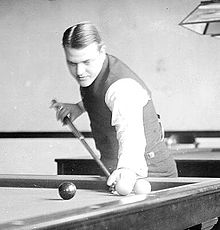
Willie "The King" Hoppe,
circa 1910.
Hoppe held the record for consecutive billiards made, 26, for fifty years. He
won 51 world titles in three-cushion billiards, four variations of balkline billiards, and cushion
caroms.
Hoppe was the only pocket billiards player to ever put on an
exhibition in the White House, where he performed for President William Taft in 1911. Hoppe was first
in the Billiards Digest rankings of the 50 Greatest Players of the
Century.
Alfredo de Oro won world titles in three-cushion billiards and straight
pool/continuous pool, and sometimes held them simultaneously. De Oro was fourth
in the Billiards Digest rankings of the 50 Greatest Players of the
Century.
The best snooker players: Mark Allen, Stuart Bingham, Marcel Camp, Ali Carter, Joe "Mr. Snooker" Davis, Steve Davis,
Peter Ebdon, Marco Fu, Barry Hawkins, Stephen Hendry,
John Higgins, Alex "Hurricane" Higgins, Ding Junhui, Shaun Murphy, Ronnie
"the Rocket"
O'Sullivan, John Pulman, Ray "Dracula" Reardon, Neil Robertson, Mark Selby, John Spencer, Dennis Taylor,
Cliff Thorburn, Judd Trump,
Jimmy "The Whirlwind" White, Mark Williams, Krzysztof Wróbel
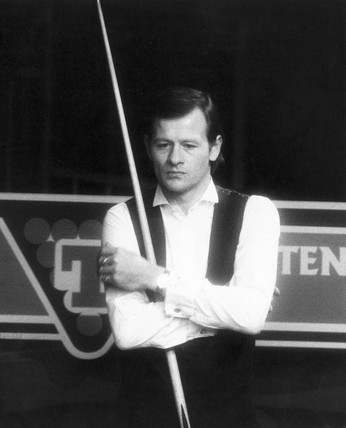
Alex "Hurricane" Higgins
The best foreign/international pool players: Ronato "Ronnie" Alcano
aka "The Volcano",
Darren "Dynamite" Appleton, Karl Boyes, Francisco Bustamante, Jung Lin Chan, Lee Van Corteza,
Steve Davis, Niels "The Terminator" Feijen, Che Wei Fu, Thorsten "The
Hitman" Hohmann, Mika "The Ice Man" Immonen, Antonio
Lining, Chris Melling, Dennis "RoboCop" Orcollo, Oliver Ortmann, Alex "The Lion" Pagulayan,
Jose Parica, Efren "Bata" Reyes, John Schmidt, Huidji See, Ralf
Souquet
The best pool commentators who were also strong players: Buddy Hall, Allen Hopkins, Billy Incardona, Grady Matthews, Vicki Paski
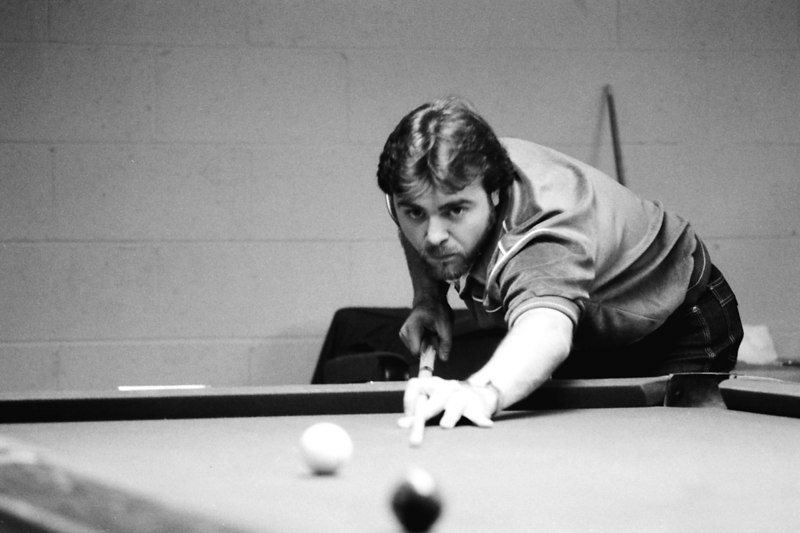
Allen Hopkins, circa the 1980s. I believe I ran into Hopkins around the time
this picture was taken, due to the beard. When Hopkins was commentating for
ESPN, he would shave, and when he was on the road he would wear a beard to make
it less likely that people would recognize him. But he was easy to identify,
once you had seen him play, because he had a very odd stroke. One night Doug
"Preacher" Almy, a friend of mine who shoots good (but not world-class)
nine-ball, made a game with a bearded stranger who called himself "John." Doug
is a good judge of talent, and even though he was ahead for awhile, once "John"
broke even with a spectacular shot, Doug walked away from the game. Doug
explained his action later by saying "He's somebody," although he didn't know
just who at the time. Not long thereafter, Doug saw "John" commentating for
ESPN, and it was Allen Hopkins, sans the beard! Around the same time, Buddy "The
Rifleman" Hall showed up in the same pool hall, so I suspect they were on the
road, headed for the next pro tournament ... probably the 1981 U.S. Open
Nine-Ball championship in Chattanooga.
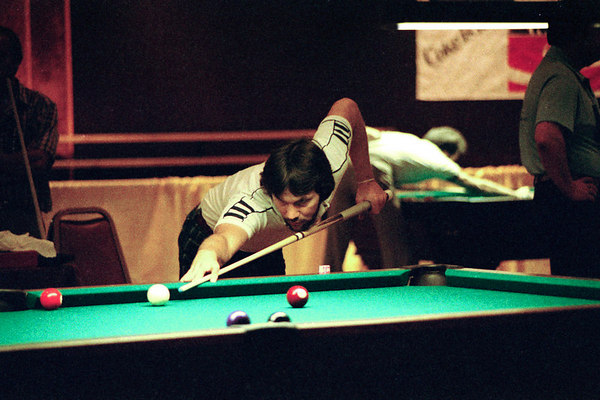
Dave Matlock (1984 photo by Mike Haines; photo editing by Bill Porter). If there
is any consensus in the pool world, it may be that Dave Matlock was the
best "bar box" player with the "big ball."
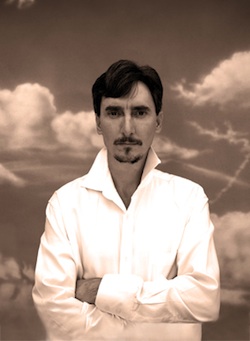
Johnny "The Scorpion" Archer
The best break: Shane Van Boening, Paul Brienza, Wade "Boom Boom" Crane, "Hurricane"
Tony Ellin, "Little" David Howard, Chuck Morgan, Earl
"The Pearl" Strickland, Nick "Kentucky Colonel" Varner
Wade Crane was voted by his peers to have
had
the best nine-ball break in history.
The best safeties/defense: Allen Hopkins, Eugene "Clem" Metz, Mike "Captain Hook" Sigel, Efren "Bata" Reyes
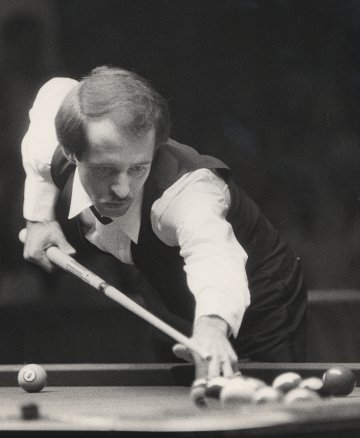
Mike "Captain Hook" Sigel
was fifth in the Billiards Digest rankings of the 50 Greatest
Players of the Century, and highest among modern nine-ball players.
The best kickers (kick shot artists): Shannon "The Cannon" Daulton,
Jose Parica, Efren "Bata" Reyes,
Danny "High Heels" Tator, Glen "The Eufaula Kid" Womack
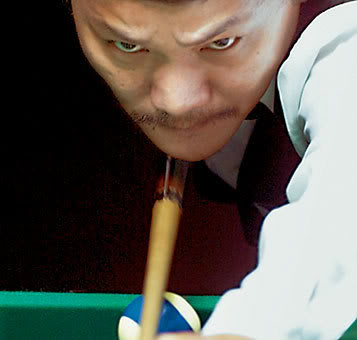
Efren "Bata" Reyes,
eying a shot intensely.
The best one-handed players: Michael "Geese" Gerace, Goosatay/Gusatay, Little
Miami, Don Willis, Eddie "Knoxville Bear" Taylor, Ronnie Allen, Jesse
Allred, Bucktooth, Cornbread Red, Mike Massey, Efren Reyes, Keith McCready, Earl Shriver, Artie Bodendorfer, Jesse "The One-Handed Hustler" James,
Martin "Omaha Fats" Kaiman, George Breedlove, Chris Raftis, Richard T. Riggie,
Sergio Vargas aka "Little Sergio," Flaco, Weldon Rogers, Scott Simonetti,
John Hasci, "Nubby" Ernest/Ernie Morgan aka "The One Armed Bandit," Clarence
Bell aka "Bucky Bell," Gary Lutman, Smokey Bartlett, Al Hogue, Tim Heath, Tucker
Shepherd
Eddie Taylor would routinely run six or seven balls playing bank one-handed.
The best ambidextrous players: Wade "Boom Boom" Crane, Buddy "the Rifleman"
Hall,
Jack "Scarface" Foreaker, Dick Leonard, Dan Louie, Keith "Earthquake" McCready,
Ronnie O'Sullivan, Jose "the Giant Killer" Parica, Efren "the Magician" Reyes,
"Little" Al Romero, Mark Strain, Cecil Tugwell, Ron Wyatt
The best "undercover" hustlers and players (the ones the general public still hasn't
heard about): Richie Ambrose, Glenn Atwell, Smokey Bartlett, Jafar Basheer aka "Patch
Eye," Jerry Brock, Eugene
Browning, Jack Cooney, Warren "The Monk" Costanzo, Vernon "Burnie"
Elliot, Ricky Gracyk,
Peter Gunn, Horace Harper, Bingo Harrison, Dennis Hatch, Larry "Gabby" Hill,
Norman "Hitch" Hitchcock, Bud Hype, Tom Jennings, Bill Lawson, Dan Louie, Dick Lane,
Frank Lively, Henry "LotsaPoppa" McCloud Jr., Peter Margo, Jimmy Matz, Chuck Morgan, Johnny Morrow,
Willie Munson, Gary "The Bushwhacker" Nolan, Reed Pierce, Gary Serville, Sam Soto, Gary Spaeth, Sonny Springer, Roy "The Cook" Stanzioni,
"Hippie" Jimmy
Reid, David Rhodes, Weldon Rogers, George Rood, Denny Searcy, Ray Schultz,
Bernie Schwartz, Randy "The Exterminator" Smith, Greg Stevens, Jay Swanson, Toby
Sweet, Mark Tadd, Danny "High Heels" Tator, Cheyenne Pete Trujillo, Cecil
Tugwell, Howard Vickery, Nick "the Indian" Vlahos, C. J. Wiley, Don
Willis, Rob "Roadplayer" Wolfe, Harold "The Best" Worst, Mike Zuglan
Who was the best pool player of all time?
Ronnie Allen said Harold Worst was the best.
Efren Reyes said Mike Sigel was the best.
Mike Sigel said Irving Crane was the best.
Willie Mosconi said Ralph Greenleaf was the best.
CELEBRITY SHARKS
"The game of billiards has destroyed my naturally sweet disposition." — Mark Twain, April
24, 1906
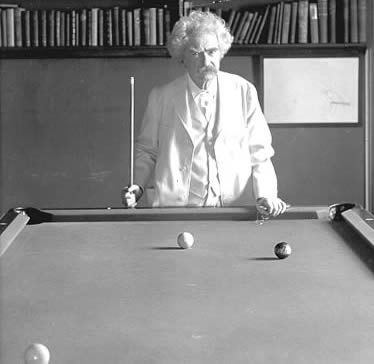
"This is a most amusing game. When you play badly it amuses me, and when I
play badly and lose my temper it certainly must amuse you." — Mark Twain
Celebrity sharks: Jackie Gleason (as Minnesota Fats in The Hustler), Tom Cruise (as Vincent
"Vince" Lauria
in The Color of Money), Paul Newman (as "Fast Eddie" Felson in both
movies), Mark Twain, Charles
Dickens, H.G. Wells, Samuel Pepys, Mozart, Shakespeare, Van Gogh, George Washington, Thomas
Jefferson, John
Adams, John Quincy Adams, Alexander Hamilton, Abraham Lincoln, Cornelius Vanderbilt, J. P. Morgan, Mary Queen of Scots,
Louis XIV, Louis XVI and Marie Antoinette, Lafayette, Napoleon, Queen Victoria,
King George IV, Cap Anson, Babe Ruth, Frank Sinatra, Milton Berle, Bob Dylan, Woody Allen, Ozzy Osbourne, Elvis Presley,
Dr. Martin Luther King Jr.
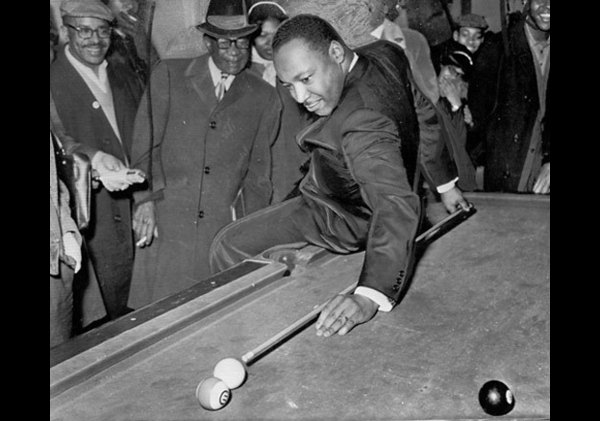
Dr. Martin Luther King Jr. shoots the eleven ball behind his back!
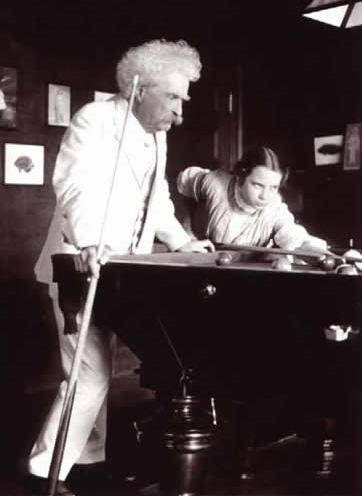
"The poorer you play, the better I shall like it." — Mark Twain, who was intensely devoted to the game of pool
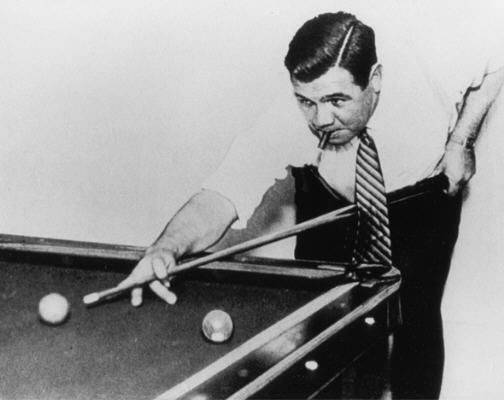
Babe Ruth played pool. But another hall of fame baseball player was probably
better. Cap Anson was a top-notch billiardist.
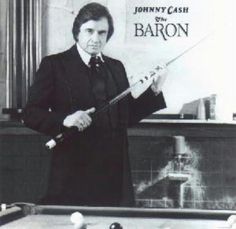
Johnny Cash playing pool in the movie The Baron.
DARK HORSES
These are truly great world champions we don't hear much about today, or not
enough ...
Bennie Allen won three consecutive straight pool titles (1913-1915)
then 35 years later became the first US national snooker champion
Andrew "Ponzi" D'Alessandro won four world titles, defeating Willie
Mosconi, Irving Crane, Jimmy Caras and Erwin Rudolph
Frank "The Inexorable Snail" Taberski won ten consecutive world titles,
defeating Ralph Greenleaf and Johnny Layton, among others
Johnny Layton won twelve three-cushion billiards championships, defeating Willie
Hoppe and Welker Cochran, among others
Thomas Hueston is one of only four players to win three-cushion and pool titles,
with Layton, Alfredo de Oro and Harold Worst
Sang Chun Lee won twelve consecutive USBA national championships (1990-2001)
Larry "Boston Shorty" Johnson was a master of 9-Ball, 1-Pocket, 3-Cushion
Billiards, 8-Ball, Straight Pool, Rotation, Cribbage, Cowboy
Ruth McGinnis was the first female superstar of pool; she had a high run of 128
and won 98% of her exhibition matches against men
Pan Xiaoting has been called the greatest female player ever
Ron Dooley might be called "The Great Question Mark" ... Is he really that good?
Has anyone ever seen him play? Does he really exist? When people say they "never
saw him lose" is that because they never saw him play?
High Honorable Mentions: Darren Appleton, Joe "The Butcher" Balsis, Jean Balukas,
Shane Van Boening, Jack "Jersey
Red" Breit, Melvin "Strawberry" Brooks, Billy "Cornbread Red" Burge,
"Machine Gun" Lou Butera, Francisco
"Django" Bustamante, Robert Cannefax, Jimmy "Boy Wonder" Caras, Irving "The Deacon" Crane,
Arthur "Babe" Cranfield, Welker Cochran, Steve Davis, Mike Dechaine, Allison "The
Duchess of Doom" Fisher, Stephen Hendry, Thorsten Hohmann, Mika "The Ice Man" Immonen, "Champagne"
Ed Kelly, Johnny "Irish" Lineen,
Ray "Cool Cat" Martin, Mike "Tennessee Tarzan" Massey, "Cowboy"
Jimmy Moore, Rodney "The Rocket" Morris, James "Cisero" Murphy, Dennis
Orcollo, Alex "The Lion" Pagulayan, Daryl "The Dazzler" Peach, Jim "King James" Rempe,
Erwin Rudolph, Jake
"the Prodigy" Schaefer Jr. and his father Jake "the Wizard" Schaefer
Sr., John Schmidt, John "Omaha" Shuput, Ralf Souquet, Alfie Taylor,
Nick "Kentucky Colonel" Varner, Dallas West, Dorothy Wise
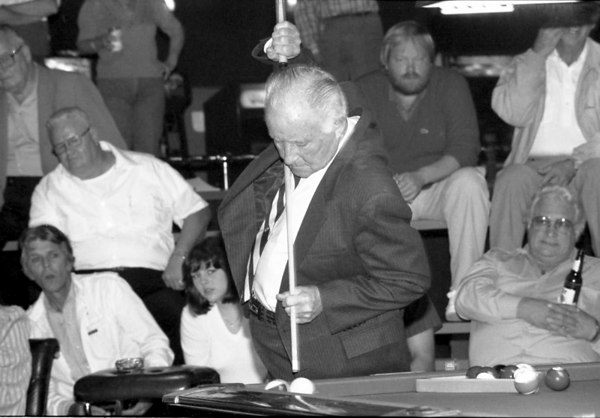
Willie Mosconi shooting a massé (1987 photo by Mike Haines; photo editing by
Bill Porter). Mosconi was second in the Billiards Digest rankings of the 50
Greatest Players of the Century, just ahead of his mentor, Ralph Greenleaf.
The best billiards/pool players by era, including the bolded names of candidates
to be the first known
pool shark. Players are listed only once, usually when they first rose to
prominence or toward the height of their powers.
1400s - King Louis XI of France is the first person known to have a billiards
table.
1500s - Cardinal Thomas Wosley, Henry III of France and Mary, Queen of Scots,
are players.
1600s - Michel Chamillard, a court favorite of Louis XIV, is called "a hero at
pool" but a "zero in the ministry."
1700s - The Earl of Chesterfield gets hustled by a "notorious gamester"
called Lookout.
1750s - Louis XVI plays billiards, often being beaten by his wife,
Marie Antoinette (the first female shark?).
1800s - François Mingaud demonstrates
the spin possible with his invention: the leather cue tip.
1810s - The Dutch Baron is the first pool shark described as such, in
Sporting Sketches.
1820s - The first official English Champion is John Carr,
the inventor of side-spin, or "English."
1840s - Michael Phelan is the first American shark and the father of American
billiards and pool.
1850s - John Roberts Sr. claims the title of "first player in
the world" and offers spots to all comers.
1870s - Top players: William Cook, John Deery, Joseph Dion, John McDevitt, A. P.
Rudolphe
1880s - Top players: Albert M. Frey, Cyrille Dion, Jake
Schaefer Sr., Maurice Vignaux, Maurice Daly
1890s - Top players: Alfredo de Oro, James L. Malone, George F.
Slosson, William Peall, Frank Ives
1900s - Top players: Willie Hoppe, Jerome Keogh, John Daly,
Thomas Hueston, W. A. Lovejoy
1910s - Top players: Ralph Greenleaf, Frank Taberski, Erwin Rudolph, Johnny Layton,
Bennie Allen
1920s - Top players: Jake Schaefer Jr., Welker Cochran, Joe Davis (snooker), Walter Lindrum,
Otto Reiselt
1930s - Top players: Eddie Taylor, John "Rags" Fitzpatrick, Joe
Balsis, Jimmy Caras, Arthur "Babe" Cranfield
1940s - Top players: Willie Mosconi, Luther "Wimpy" Lassiter,
Don Willis, Irving "Deacon" Crane
1950s - Top players: Harold Worst, Ronnie Allen, "Champagne" Ed
Kelly, Steve Mizerak, Leonard "Bugs" Rucker
1960s - Top players: James "Cisero" Murphy, Larry "Boston Shorty" Johnson,
Cornbread Red, Raymond Ceulemans
1970s - Top players: Buddy Hall, Louie Roberts, Mike Sigel,
Allen Hopkins, Jimmy Mataya, Jim Rempe, Jean Balukas
1980s - Top players: Efren Reyes, Earl "The Pearl" Strickland,
Nick Varner, Oliver Ortmann, Steve Davis (snooker)
1990s - Top players: Johnny Archer, Ralph
Souquet, Sang Lee (billiards), Ronnie "The Rocket" O'Sullivan (snooker)
2000s - Top players: Shane Van Boening, Mika Immonen, Niels Feijen,
Alex Pagulayan, Mike Massey (artistic)
2010s - Top players: Darren Appleton, Dennis Orcollo, Thorsten Hohmann, Allison Fisher,
Ronnie O'Sullivan (snooker)
2020s - Top players: Francisco Sanchez-Ruiz, Shane Van Boening, Joshua Filler,
Mario He, Jayson Shaw
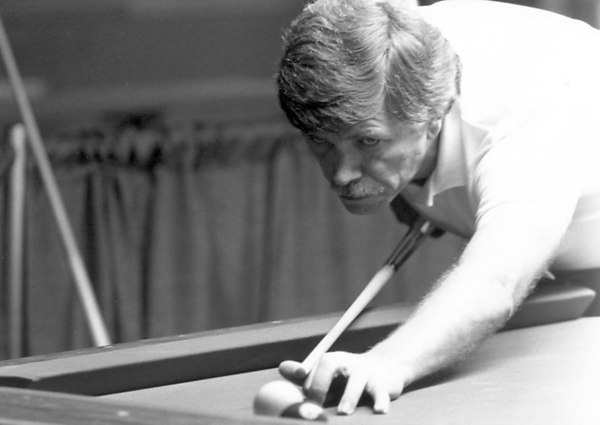
Larry "The Iceman" Hubbart (photo by Bill Porter).
Up-and-Coming and Honorable Mentions: Justin Bergman, Carlo Biado, Tony Chohan,
Jung Lin Chang, Ko Ping Chung, Lee Vann Corteza, Corey Deuel, Joshua Filler, Kim
Ga-young, Raj Hundal, Billy Incardona, Wu Jiaqing, Eklent
Kaci aka the "Albanian Eagle," Warren Kiamco, Chris Melling, Alban Ouschan, Jasmin Ouschan, Ko Pin-yi, Jayson
Shaw, Tony Watson, Skyler Woodward
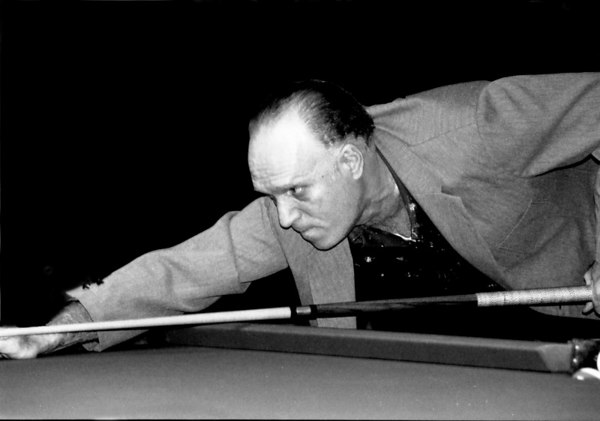
Jack "Jersey Red" Breit (1987 photo by Mike Haines; photo editing by Bill Porter).
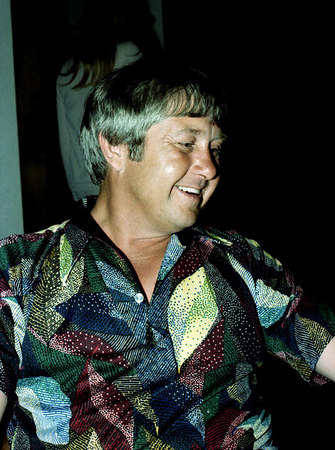
Ronnie Allen during his psychedelic days, or was it a psychedelic haze? (1980
photo by Mike Haines/Bill Porter). According to "Hippie" Jimmy Reid, Walter
Tevis, the author of The Hustler and The Color of Money
confirmed in a tape-recorded interview (while they were playing chess in a suite
at the Holiday Inn in Dayton, Ohio) that "Fast Eddie" Felson was based on Ronnie
Allen. According to Reid, "At one point during this interview, I became the
interviewer instead of interviewee, I flat out asked Mr. Tevis who he based Fast
Eddie Felson on? His reply went something like this: I went to Corcoran’s Pool
Room in Frisco and saw a young, brash player by the name of Ronnie Allen who was
a worldbeater, got the idea for the book and the rest is fiction and history."
According to an online post on the subject by Jay Helfert, "Ronnie Allen did
have more title to the claim, based on several occurrences. He was running
around San Francisco around 1959-60 and calling himself Eddie. He was prone to
raise the bet so fast that someone (Jack Perkins maybe) started calling him Fast
Eddie. Jack told me that when he saw Ronnie come in the poolroom he called out,
'Here comes that Fast Eddie again!' Word of his exploits reached all across the
country. Even in the Midwest, word was out on this brash young kid, who was
hustling and beating the best hustlers in San Francisco. Whether Tevis ever went
out there or not I do not know. What I do know was that he was a keen observer
of the pool scene, mostly hanging in the pool rooms in Louisville and
Lexington. As far as Fats is concerned, Eddie Taylor probably had more influence
on Tevis than anyone else. Walter definitely watched Taylor in action on more
than one occasion. Eddie was a portly man who dressed immaculately and was
always a gentleman at (and away from) the table. And he was a GREAT player, the
best around, and certainly the best Tevis witnessed at that time. Any of this
sound familiar? So if we are going to give credit, let's give it where it is
due."
Per a June 2, 1987 article in the Los Angeles Times, "In those
days, Minnesota Fats said of Allen: 'Anybody who plays him for money ain't go no
chance at all. I'm the only guy in the whole world who can beat him.' (Allen
contends that he has beaten Fats. He has lost to him, as well.) It was also in
those days, as Allen tells it, that writer Walter Tevis was hanging around pool
halls, collecting material for his book, The Hustler. Allen and others
in the world of pool say that Tevis based his book on the Oklahoma City player."
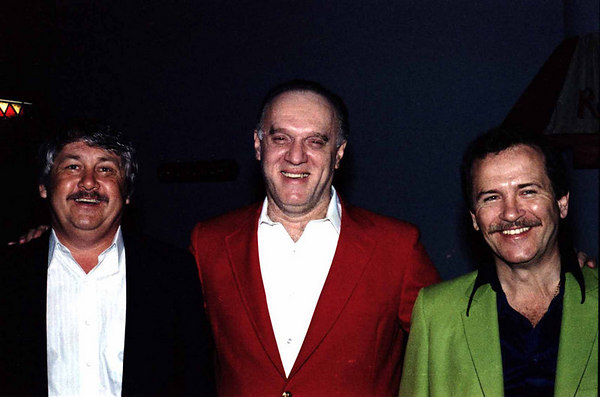
Ronnie Allen, Jack Breit and "Champagne" Ed Kelly (circa 1983-1984; photo by Mike
Haines/Bill Porter).
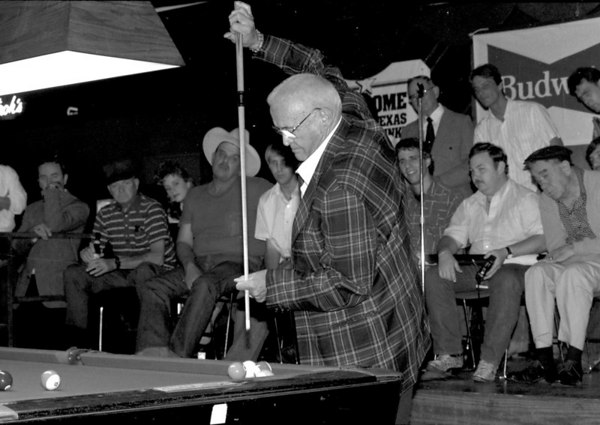
"Cowboy" Jimmy Moore either shooting a trick shot or recovering from incredibly
bad shape (1987 photo by Mike Haines; photo editing by Bill Porter).
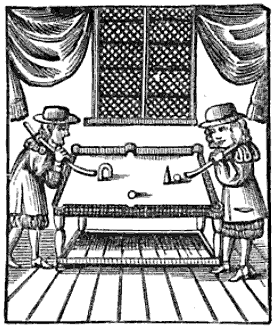
The History of Pool, Part I: The game of billiards dates back at least to the 1300s, at which time
it was an outdoor game similar to croquet and golf. It seems likely that wealthy people wanted to enjoy
billiards when the weather was bad, and were willing to pay substantial amounts of money to have the
game brought indoors. This may explain why billiard table covers were historically green, as they
represented a grass playing field. The rails resembled river banks; hence the
term "bank shot." The earliest versions of billiards included arches similar to
croquet hoops, and maces similar to golf clubs. (In fact, the term "cue" derives from the French word
"queue," which means "tail." The thinner "tail" was used when a ball was too close to the rail for the bulky
mace head to engage it.) The first pool table on record, built for Louis XI by the carpenter Henry de Vigne around 1470, had a bed of stone covered with cloth and a "hole at the centre, into
which the balls were driven." So the first documented billiard table sounds like a putting green! The first female shark may have
been Marie Antoinette. She had an exquisite cue carved out of a single piece of ivory,
which was inlaid with gold. She kept the
cue in a special locking cabinet and wore the key around her neck!
The History of Pool, Part II: By the mid-19th century, elephants were being
slaughtered for their ivory at an alarming rate, primarily to keep up with the
booming demand for billiard balls. Records show that in 1890 approximately 750 tons of
ivory entered England via London alone. It was said that at peak demand some
12,000 elephants were slaughtered each year to supply England with billiard
balls. Ivory balls became very expensive; and people began to feel a moral
repulsion about such excessive slaughters. The billiard industry realized that
elephants were endangered, and that ivory was dangerous to obtain (an issue of
notable public concern at the time). Therefore, inventors were challenged to come up with
an alternative material, with a $10,000 prize being
offered by a New York supplier (around $175,000 today). John Wesley Hyatt
invented such a manufacturable material in 1869, called nitrocellulose (US
patent 50359, the first American patent for billiard balls). It is unclear if
the cash prize was ever awarded. By 1870 nitrocellulose was commercially branded
Celluloid, the first industrial plastic. Unfortunately, celluloid was volatile
in production, occasionally exploding. Legend has it that celluloid billiard
balls would occasionally explode during play, but no reliable sources have been
found to substantiate this. Subsequently, other synthetic materials were used,
such as Bakelite, Crystalite and other plastic compounds. Today most pool balls
are made of phenolic resin, an extremely strong, chip-resistant plastic.
The History of Pool, Part III: The first player recognized as the
English Champion was John Carr of Bath. However, in 1824 when a deciding match
for the champion's title was arranged with Edwin (Jonathan) Kentfield, Carr failed
to appear. Kentfield then became known as "the first player in the world." He
remained so until 1849 when John Roberts challenged Kentfield. Kentfield "pulled
a Carr" and failed
to arrive for the proposed match, so Roberts claimed the title of "first player
in the world" by default.
The History of Pool, Part IV: During the 1850s, Michael Phelan and his
associates began making a significantly different American style of billiard
table. The cushions were lower in height and the pocket openings became
"sharply cornered" in contrast to the gradual curvature of the English cushion
(as with snooker tables to this day). Phelan became recognized as "the Father of
American Pocket Billiards." Pool became so popular in the United States
that during the Civil War billiards sometimes received greater press coverage
than the battles.
The History of Pool, Part V: In 1870 the first official English championship was
played (finally!) between John Roberts and William Cook. This match was regarded as
being of such
importance that it was attended by the Prince of Wales. Cook took the title from
John Roberts. Some five years John
Roberts Junior took the title from William Cook and was regarded as the
foremost billiard player in the world until his retirement in 1909. The term
"pool room" probably became associated with pocket
billiards when tables were installed in the rooms used by gamblers to pass time
while betting on horse races. Eight ball was invented shortly after 1900;
straight pool followed in 1910; nine-ball around 1920.
The History of Pool, Part VI: Neville Chamberlain, a future prime minister of
England, helped invent the modern game we call snooker around 1875 by
introducing numbered balls in addition to the black.
When billiards champion John Roberts met Chamberlain in India in 1885, he
elected to help popularize the new game. The first professional snooker
championship was held in Birmingham, England in 1927. Joe Davis, the first
snooker superstar and the winner of 15 consecutive snooker championships from
1927-1946, was one of the organizers.
The History of Pool, Part VII: Did TV kill straight pool? The 1973 U.S. Open,
held in the Grand Ballroom of the Sheraton-Chicago Hotel, may have spelled the
end of straight pool as a spectator sport, thanks to TV. The finals that year
featured Steve "the Miz" Mizerak, the affable John Madden of pool, against the
notorious North Carolina hustler Luther "Wimpy" Lassiter. At that time, Mizerak
and Lassiter were the cream of the straight pool crop. Mizerak had won the three
previous U.S. Opens. Lassiter had won a slew of major tournaments during the
1960s. Both players appear in Billiard Digest's list of the top ten
players of the century. The stage was perfectly set for an epic battle, and
ABC's cameras were there to transmit it electronically to the viewing public's
couch potatoes. It was like pool's Babe Ruth squaring off against its Ty Cobb,
with everything on the line. But there was a major problem: time, compounded by
booringness. According to the New York Times, "Mizerak, unbeaten in the
double-elimination tourney, lost a marathon match that started last night and
lasted more than 4 hours, 150-110, in 22 innings." Matt Racki of the
Billiard Revue said that Mizerak played the first game "like his cue had
been in a deep freeze for a few years." And because Lassiter won, a second game
was required to determine the champion. Unfortunately, it wasn't much better for
spectators. Mizerak, usually the picture of joviality and optimism, later said
that the double marathon "just took too long to film." Pool historian Charles
Ursitti pointed out that a long stretch of safety play made for "wretched"
television. According to Ursitti, "They used to televise the U.S. Open on ABC
for years ... it was straight pool and only straight pool. For the die-hard fan,
that's what you want to see. But it can get boring, and in 1973, they got into
about 18 minutes of safety play. And of course, 18 minutes of playing safe is
extremely hard to edit. What people want to see is offense. They want to see a
lot of downtown shots. And so [the TV networks] abandoned it. CBS and ABC said,
'That's that. We're done.'" Within a few years, by 1978, the BCA (Billiard
Congress of America) had also abandoned straight pool for
nine-ball. The fledgling PPPA (Professional Pool Players Association)
soon followed suit. Thus the prediction of the legendary Jansco brothers, the
first great promoters of pool, that straight pool would lose out to nine-ball,
had come to pass. Why? Primarily because nine-ball is faster and more
entertaining. Another important factor, no doubt, was the booming popularity of
coin-operated bar tables, which make it troublesome and expensive to spot balls.
Soon millions of pool enthusiasts were playing on tables that didn't
lend themselves to games like straight pool and one-pocket, and of course
most amateurs would much rather take wildly exciting offensive risks than play
safety after mind-numbing safety. (In many bars today, playing safe is just
above pedophilia and incest on the list of "thou shalt nots.") But the original
"kiss" of death, if you'll pardon the pun, for straight pool was time's.
Notorious Sharks, Part I: The most notorious pool shark in history may have been
John Wilkes Booth. According to Henry Hogan, after his acting performances were
over, Booth would hurry down to Joe Dillon's billiard hall to play with the
"best in the city." He was also said to have frequented the Miller Billiard Parlor,
located on the second floor of the National Theater Building (where the Helen
Hayes Gallery now resides). On April 13, 1865, Booth dropped by Grover's Theatre
and asked C. D. Hess if President Lincoln was going to be invited to attend Aladdin
or The Wonderful Lamp. Hess assured Booth that Lincoln would
be invited. Booth then went upstairs to Deery's Billiard Saloon, located above
the lobby of Grover's Theatre, where he drank whiskey until eight in the
evening. Booth asked the
saloon's owner, John Deery, a national pool champion, to secure him tickets for the box that adjoined the box where the
Lincolns would be sitting. According
to what Deery told the New York Times in an
article published on October 5, 1921, Booth had been drinking all day, before
he shot the president. According to another account by Ernest C. Miller,
Deery said: "For a period of about ten days before the assassination, he visited
my place every day, sometimes in the afternoon, sometimes in the evenings. At
this time he was out of an engagement and drinking quite freely, noticeably so,
even for him, I thought. At times he seemed a bit crazed, apparently on account
of the frequency of his potations ... During that last week at Washington he
sometimes drank at my bar as much as a quart in the space of less than two hours
of an evening ... I believe Booth was as much crazed by the liquor he drank as
by any motive when he shot Lincoln."
Notorious Sharks, Part II: Jonathan Swift mentioned billiards along with
nine-pins in "The History of John Bull," published in 1712. He was also quoted
as saying, "I've always believed no matter how many shots I miss, I'm going to make the next one."
At that time billiard balls were still being pushed around
with maces. But the game was about to evolve. One of the most famous pool sharks was a French
infantry captain, Francois Mingaud. In 1807 he introduced the leather cue tip,
which provided gripping power and allowed the use of spin (ironically
now called "english"). Allegedly, Mingaud developed techniques of controlled
spin while playing billiards in a Paris prison, and when eligible for release, he
requested further time in prison in order to improve
his techniques! He has been credited with the application of extreme spin known
as the massé (a French word related to "mace"). John Carr, who worked in a
billiard hall in Bath as a marker, was credited with the invention of the "side
stroke" which became known as "english." Carr became "England's champion
billiardist" with an astonishing (for the time) run of 22 consecutive made
shots. He explained his prowess as being due to a special brand of "twisting
powder" which he sold to other players for considerable sums of money due to its
magical properties. Little did they know that it was ordinary chalk. In any
case, leather cue tips and chalk are still standard fare in pool rooms around
the world today (although modern pool chalk is no longer of the blackboard
variety).
Notorious Sharks, Part III: In 1828, opponents of President John Quincy Adams
charged that he kept "gaming tables and gambling furniture" in the White House.
According to Edwin A. Miles, the president's billiard table "served as the
keynote" for political attacks on Adams, in what quickly became one of the
dirtiest presidential campaigns in American history. His owning
a billiard table was used by his enemies to portray Adams as an
aristocrat, so at least he was an upper crust shark, according to them!
Notorious Sharks, Part IV: The enemies of John Quincy Adams were obviously unaware that the
father of their country was a pool shark! George Washington kept detailed records of his wins and
losses at billiards in his diaries. So we know that his biggest score was $1.75, a tidy sum in those
pre-inflation days.
Notorious Sharks, Part V: According to the Brunswick billiard table company website, "The first
real American celebrity who owned a Brunswick table was an immensely important person in American
history—Abraham Lincoln. Lincoln was a self-confessed 'billiards addict.' He described the game as
a 'health inspiring, scientific game, lending recreation to the otherwise fatigued mind.'" General
George Armstrong Custer also owned a Brunswick table, and Buffalo Bill Cody bought Brunswick tables
for his hotel in Cheyenne.
Famous Sharks, Part I: Baseball hall-of-famer "Cap" Anson (Captain Adrian Constantine Anson)
was a strong billiards player. Anson was the first major league baseball
player to get 3,000 hits, and over 100 years after his retirement, he still
holds several Cubs franchise records, including most career hits, runs, doubles
and runs batted in. He joins Babe Ruth and Hank Aaron as the only major league
baseball players with more than 2,000 runs batted in. After his retirement from
baseball, Anson opened an emporium in Chicago which was
billed as having "the largest and best equipped billiard and pool rooms in the
world." On December 9, 1910, in a tournament at the Union Billiard Academy,
Anson gave George W. Moore, a world champion billiardist, all he could handle,
losing 50 to 42 in a race that was neck-and-neck until Anson went scoreless
after being up 42 to 41. According to the World Almanac and Encyclopaedia,
just two days earlier, Moore had set a new three-cushion billiard record for
consecutive shots made, at 15. That was in a tournament against world-class
opponents such as Alfredo de Oro and John W. Daly. Moore won a world title in
1915 and had a number of wins over de Oro, who was fourth in the Billiards
Digest rankings of the 50 Greatest Players of the Century. So Cap Anson was
obviously no bush-leaguer at three-cushion billiards, if he was able to take
Moore to the limit. According to a New York Times article published the
following day, Anson showed "remarkable form" and had two runs of five billiards
before he ran out of steam at the end.
MISCELLANEA
Why are there no women in my top twenty? Not because I'm sexist, but because,
for whatever reason, the best female players are still not as good as the best
men. For instance, Jean Balukas had a high straight pool run of 134, which is
damn good, but some of the men on my list have doubled or tripled that number.
Willie Mosconi nearly quadrupled it. But women are narrowing the gap. Ewa "The
Striking Viking" had the high straight pool run in WPBA competition for many
years, with 68 balls in 1992. More recently, Loree Jon Jones, Jennifer Chen and
Jeanette Lee have had runs in the range of 140 to 150+ consecutive pocketed
balls. That is STRONG. Alfredo de Oro's high run in a tournament was only 82 balls, according the
New Illustrated Encyclopedia of Billiards, so things can become a bit hazy.
But there are hundreds of men, many of them unknown to the public, who have run
150 balls at straight pool, so for now I'm going to stick to my guns and say
that while there are some great female players, the best male players are still
better.
Any player on the list above, at his absolute best would be hard to beat, so the "best
player" at any time is the one with the most talent, playing his best game, who has the
hottest hand. But the very best players were the ones who played at the highest
levels the longest. When Louie Roberts and Keith McCready were "on"
they
could play with anybody, but they didn't hit their top speed and maintain it
as consistently as the higher ranked players. If I had to pick one player to shoot
for me with
everything on the line, I would probably pick Buddy Hall for his remarkable
consistency and composure. But if I wanted to be entertained, I would choose the
charismatic go-for-broke run-out kings: Louie, Earthquake, Fast Eddie, Fats, the Pearl.
In an AZbilliards poll, Harold Worst was picked by a well-informed panel as the third-best American pool
player of all time, after Willie Mosconi and Earl Strickland. But was Worst the
best all-round, since he excelled at pocket billiards, while they couldn't hope to match him
at cushion billiards? Worst was a world-class player at three-cushion
billiards, straight rail, nine-ball,
one-pocket, straight pool and snooker. Bank seems to have been his only possible
weakness, but he was a cut shot artist who didn't need to bank in order to win,
and there were no major bank tournaments in his era. When Harold Worst was at
his best, the championship games were the aforementioned ones. And during the last year
of his life, when he was in his prime, he cleaned everyone's clocks at those
games, despite being sick with terminal brain cancer that ended his life at age
37. To learn more about this incredible pool shark, please click this hyperlink:
Was Harold Worst
the Best Pool Player Ever? Experts who have nominated Worst as the best (or
one of the very best) include Willie "the King" Hoppe, Ralph "Minnesota Fats"
Wanderone, "Toupee" Jay Helfert,
Johnny Ervolino, Freddy "the Beard" Bentivegna, "Champagne" Eddie
Kelly,
Artie Bodendorfer, "Fast" Larry Gunninger,
Bill "Mr. Three Cushion" Smith,
George Fels and Ronnie "Fast Eddie" Allen. One might also suggest that all-time
greats like Luther "Wimpy" Lassiter and Eddie "The Knoxville Bear" Taylor also
nominated Worst by dodging him at nine-ball and one-pocket, respectively.
Ronnie Allen: "In my professional opinion, Harold Worst was the greatest pool
player who ever lived, or ever will live."
Freddy "the Beard" Bentivegna: "As far as pool players go, we were all
earthlings and Harold was from another planet."
"Toupee" Jay Helfert: "In the last years of his life, he was generally
acknowledged by his peers as the best player alive ... He was the dominant force
in pool, the equal of any man at any game."
Minnesota Fats nominated Harold Worst as the best pool player of his generation,
saying that he was "in my opinion the best pool player in the world at the time
of his death in the summer of 1965, at age 37 ... Worst not only made a
successful switch [from three-cushion billiards to pocket billiards], but he
whacked out the top one-pocket and straight pool players all over the country
... What made Worst's accomplishments so remarkable was that he only entered two
tournaments, yet he won both of them."
The Best Celebrity Sharks
#10) Paul Newman, who starred in The Hustler, picked up enough to run a
rack from time to time.
#9) Tom Cruise made most of his own shots in The Color of Money,
including a massé that he made three times in a row.
#8) Peter Falk of Columbo fame was a top celebrity pool player in the
60s and 70s, despite having only one eye!
#7) Dustin Hoffman is reputed to be a strong snooker player on a 6x12 table.
James Garner was the best player in Norman,
Oklahoma when he was a young man, according to Jay Helfert.
#6) Leo Durocher was such a good pool player as a young man that he considered
pool as a career, over baseball.
#5) Jackie Gleason played Minnesota Fats in The Hustler and executed his own trick shots; he
was able to run 40-50 balls at straight pool.
When Paul Newman challenged Gleason to a game for
$50, Gleason ran 15 balls and won. Newman paid up
the next day with 5,000 pennies!
#4) Jerry Orbach of Law and Order once gave Cornbread Red a three-hour
run for his money. Orbach's high run was 67. On the Tonight Show in
1973, he ran the table on Minnesota Fats.
Mark Kendall of Great White has been witnessed
running 62 balls
#3) Walter Alston, the manager of the Los Angeles Dodgers, had a high straight
pool run of over 100 balls.
#2) Fred Astaire was known to devote up to six hours per day to straight pool,
and was able to run 100 balls.
In his Memories and Adventures, Sir
Arthur Conan Doyle wrote "Surely billiards is the king of all indoor games." He
played in the Amateur Billiards Championship in1913 and once had a 100 break
against Greenhough Smith.
#1) Mark Twain is rumored to have run 100 balls; in any case, by his
own admission he was a pool nut.
Abraham Lincoln was also a pool enthusiast.
Unfortunately so was John Wilkes Booth, who got loaded in a pool hall the day
he shot Lincoln.
Albert Pain, the friend and biographer of Mark Twain, said that America's
greatest writer and humorist was "obsessed" with billiards. Twain by his own
admission "knew nothing of the art of pocketing balls," but nonetheless managed
to run the table against George Dolby, who fancied himself to be a master of
fifteen-ball, the forerunner of modern straight pool. Twain's account suggests
that he was a quick study and quite adept at billiards. Twain wrote of being in
New York to see Hoppe and Schaefer and Sutton play. So he was familiar with the
games of the masters of his era. But Twain also praised the abilities of a
hustler he called "Texas Tom," who played in the "perishing saloons" of Jackass
Gulch. Twain claimed to get plenty of exercise playing pool, walking ten hours
per day with cue in hand. He also claimed to get nine hours of "exercise" per
day during the week, and ten to twelve on Sunday.
Honorable Mention Celebrity Pool Players: Ben Affleck, Cap Anson, Milton Berle,
David Brenner, James Caan, Johnny Cash, Walter Cronkite, Matt Damon, Peter
Graves, Dorian Harewood, Buck Henry, Waylon Jennings, Johnny Johnston, Dr.
Martin Luther King Jr., Jack Klugman, David Letterman, Gugliermo Marconi,
Wolfgang Amadeus Mozart, Willie Nelson, Barack Obama, Manny Pacquiao, Lou
Diamond Phillips, Prince, Joe Rogan, Babe Ruth, Ken Shamrock, Charlie Sheen,
Paul Sorvino, Kiefer Sutherland, James Tolkan, Michael Vartan, Jack White, Flip
Wilson
Best Pool Jokes
Two players are complaining that the pockets on the table they're gambling on
are too loose. Minnesota Fats interjects some sage advice: "Raise the bet ...
they'll tighten up!"
A pool player in a tuxedo is like whipped cream on a hot dog. — Minnesota Fats
If Cornbread Red ever plays me, he'll be known as "No Bread Red." — Minnesota
Fats
"Some hustlers l knew were terrific actors. You would swear they were drunk, or
sick, or just learning to play. Tugboat Whaley used to put on rain gear, rubber
hat and all, and say he was a tugboat captain who had just retired on a nice
pension that he didn’t know how to spend. Wimpy Lassiter, before the tournament
prizes got big enough to draw him into the limelight, dressed up like a
hillbilly; with bib overalls and a piece of straw a foot long hanging off his
lip. That was his hustle, pretending he just fell off a hay wagon."
―
Danny McGoorty
Here is what my friend Doug Almy, a good player and a keen student of the game,
told me about one of the great "undercover" hustlers of all time: "Mike, We are
back from our trip and will have to get together soon. When I was in Tucson, AZ,
I went to the pool hall that is the place to go now called 'Pockets.' I saw one
person I knew 40 years ago when I lived there. I also spent some time talking to
the owner who had the place since the early 1990's. We talked about road players
and various pros and hustlers and the name Alfie Taylor came up. He said Alfie
(or Alf as he called him) had a store in Tucson that sold Middle Eastern art and
furniture. He did not know the address of the store because he said the store
had recently moved. I googled Alf's name, found it, and read the 'about me'
part. It would be interesting to read his book. I saw him play once or twice in
Tucson when I lived there and there is no telling how good he played. He was
very good at looking like anything from a beginner to a mediocre player. When I
got to Nashville I found people here that knew of him, which was surprising
because I had been told he went by different names: Grover being one of them.
From what the owner said, Alfie does not play pool anymore or at least not any
serious pool. I cannot remember ever seeing a player that made shooting various
shots look so easy. I would say he was probably the most 'at ease' player I have
ever seen, but then again he knew how to match up and to my knowledge he never
played in any tournaments."
Move buffs may be interested to know that a number of players mentioned here appeared in the
1986 movie The Color of Money and/or served as technical advisers. Sharks with speaking roles
included Steve "The Miz" Mizerak, Grady "The Professor" Mathews, and Keith
"Earthquake" McCready. There were cameo appearances by Jimmy "Pretty Boy Floyd"
Mataya, Mark Jarvis, Howard Vickery and "Saint Louie" Louie Roberts. Mike "Captain
Hook" Sigel was the movie's technical director. Sigel and Ewa Mataya Laurance, aka "The
Striking Viking," served as technical consultants and performed shots. Paul Newman won an Oscar
for his portrayal of an aging "Fast Eddie" Felson, whose cocky protégé,
Vincent "Vince" Lauria, played by Tom Cruise, seemed a lot like his younger self.
Pool legend Willie "Mr. Pocket Billiards" Mosconi had a cameo in the 1961 movie The Hustler,
one of the very best sports movies of all time, and one of the darkest. It starred Paul
Newman as a young, reckless "Fast Eddie" Felson. Mosconi also
served as a consultant and executed the movie's trick shots, except for those of fat man.
Indeed, Jackie Gleason was
recommended for the Minnesota Fats role by Mosconi because he was an accomplished pool shooter. Thus,
a "wide angle" lens could be used on his shots (please pardon the pun). The Hustler
was well-received by critics and the public. It was nominated for nine Academy Awards, including best
picture, Newman for best actor, Piper Laurie for best actress, and
Gleason and George C. Scott for best supporting actor. The film won two Oscars, for art
direction and cinematography. There is more information about both movies and the real-life sharks who
helped create their cinematic magic, later on this page.
How good was Willie Mosconi? Pretty damn good. His best game was straight pool, but
when he matched up with Minnesota Fats gambling at one-pocket in the
early 1950s, Fats reportedly asked his backers for more money, saying:
"Willie has no idea how to play this game, he just keeps running eight and out!"
I've seen top road players like Buddy Hall do the same thing. When they want to
win money fast, they can shorten slower games like bank and one-pocket by
going on the offensive, knowing that more often than not, they can get out. And
they can demoralize their opponents at the same time. Fats may have out-hustled
most of the shortstops he played, but what, pray tell, is the defense against a
table master's continual runs?
James Coburn and Omar Sharif played big-stake pool hustlers in the 1980 movie
The Baltimore Bullet, which featured cameos by a number of real-life
sharks who played themselves: "Machine Gun" Lou Butera, Irving "The Surgeon"
Crane, Richie Florence, Allen "Young Hoppe" Hopkins, Pete Margo, Ray "Cool Cat"
Martin, Jimmy "Pretty Boy Floyd" Mataya, Steve "The Miz" Mizerak, Willie
Mosconi, Jim "King James" Rempe, and Mike "Captain Hook" Sigel. (Mosconi
received top billing, with the names of the other sharks appearing below his in
alphabetic order.) The movie involves one of the Jansco brothers' legendary
Johnston City "pool hustler" tournaments, which ran from 1961 to 1972
and really did attract
players like Butera, Crane and company. And the movie's FBI bust actually
happened in 1972, killing the action. But it's a bit anachronistic that the movie centers around
straight pool. As Danny DiLiberto once pointed out, the Janscos "were the ones
to really throw out straight pool," as they preferred the more entertaining
gamblers' games of nine-ball and one-pocket. In The Baltimore Bullet,
Coburn plays an aging "Fast Eddie" character similar to Newman's in The
Color of Money, Bruce Boxleitner plays his brash protégé in a role similar
to Cruise's, while Sharif plays a more suave Minnesota Fats. Since TBB
came out several years before TCOM, one might suggest that TBB
is the more original of the two, with both paying homage to The Hustler.
And while I have seen TBB being panned here and there for not being as
profound as its progenitor, it's a comedy not meant to be taken
too seriously, and I found it to be both
entertaining and enjoyable.
Minnesota Fats played himself in the 1971 movie The Player, which had only a limited release. While Fats was probably not the absolute
best pool player (despite his many verbose assertions to the contrary), he was
nonetheless a top shark, not the shortstop some revisionists have tried to turn
him into. As Larry Gunninger has pointed out, when the Johnston City tournaments
were in full swing, attracting the cream of the pocket billiards crop, it was Fats who
ended up with most of the moolah. And as Muhammad Ali once pointed out, "It ain't
braggin' if you can back it up."
Poolhall Junkies is a somewhat obscure
movie starring Christopher Walken (who made his one trick shot on the first
attempt). Robert "Cotton" LeBlanc served as a technical adviser, had a cameo,
and performed most of the trick shots. Ironically, Mike "Tennessee Tarzan"
Massey, who played "St. Louie" Louie Roberts in the movie, didn't shoot any
of the movie's
trick shots, even though he's probably the world's most
famous trick shot artist.
Country music legend Johnny Cash, the "Man in Black," played a pool hustler in
the made-for-TV movie The Baron and the Kid.
W. C. Fields starred as a hustler in the first film he made, the 1915 silent
movie Pool Sharks.
It has been my good fortune to have seen some of the best tournament pool
players, sharks and hustlers: Johnny Archer, Buddy Hall,
Truman Hogue, Allen Hopkins, David Howard, Jeanette Lee, Mike Massey, Keith McCready,
Alex Pagulayan, Efren Reyes, Mike Sigel, Earl Strickland, Nick
Varner, et al. I even saw Steve Davis score a perfect 147 in snooker. (I was on vacation in
England when he hit the magical number, in a match televised by the BBC.) But
the most charismatic, exciting and crowd-pleasing pool player that I have ever seen
personally was "St. Louie" Louie Roberts. He was an incredible,
fearless shot-maker. There was something magical about his game, when he was "on." I remember watching him advance through the
losers' bracket at the 1981 U.S. Open Nine-ball Championship, promoted by Mike
Massey at the Downtown Sheraton Hotel in Chattanooga, Tennessee. As I remember things, Roberts had lost his opening round match,
and then almost lost a second time to the little-known Nat Green.
In that match, there was a controversy about someone breaking out of turn and the referee not
catching it, so that Roberts ended up breaking the last two games despite an
alternating break format. I believe
Roberts either made the nine on the break, or broke and ran out, in the "double hill"
game. After that, he seemed
to freewheel, drinking openly, bantering with fans, and mostly disdaining
safeties. If his opponent made a ball out of turn, and two balls
were lined up on the spot, Louie would hit the head ball with so much English
that he banked the second ball in "long rail" ... a shot that I have never seen anyone else
attempt in a major nine-ball tournament. Roberts went on to defeat a perplexed Buddy
Hall, who just shook his head at Louie's crowd-pleasing antics and incredible
shotmaking. I believe it had been a longtime dream of
Louie's to beat Buddy Hall, who was the world's top tournament nine-ball player at the time.
What Louie accomplished that day, and how he accomplished it, was magical, and
I'll never forget how he had the crowd eating out of the palm of his hand until
he was proclaimed the victor, to wildly delighted cheers that included my own.
Who won the most money in a single tournament? Earl
Strickland ran 11 consecutive racks against Nick Mannino during the first
PCA tournament in 1996. There was a stipulation that anyone who could break and
run 10 racks would win a million dollars. But because of a racking "glitch,"
Strickland had to run 11 racks. Jimmy "Pretty Boy Floyd" Mataya, who was present at the
event, witnessed Strickland's last shot, a tough nine-ball combination in which
Earl showed no fear and "fired it in with authority" to win the prize.
(But the insurance bean-counters declined to pay!)
Who won the biggest purse? In 1996, Efren Reyes defeated Earl Strickland in a
winner-take-all "Color of Money" match for $100,000. At the IPT King of the Hill
8-Ball Shootout in December 2005 at the Orlando Convention, 42 top players
competed in a round-robin format. Efren Reyes defeated Mike Sigel in the finals
and pocketed $200,000. At the North American Open 8-Ball Championship in July
2006 in Las Vegas, Nevada, Thorsten Hohmann defeated Marlon Manalo and won
$350,000. At the World Open 8-Ball Championship in September 2006 in Reno,
Nevada, Efren Reyes defeated Rodney Morris and won $500,000.
Who won the biggest bet playing in money games? No one knows for sure. However,
it has been claimed that when Efren Reyes first came to the United States and no
one knew who he was, he was making $80,000 per week.
Who has the highest earnings in a single season? Efren Reyes, with $646,000 in
2006. However, a number of British snooker players make similar sums of money;
for instance Neil Robertson earned $565,750 in 2013-2014.
Who has the highest career earnings? Among pool players, probably Efren Reyes, with career revenues
estimated at $1.7 million. However, Ronnie O'Sullivan and Stephen Hendry top the snooker career earnings list
with well over $10 million each. Ronnie O'Sullivan recently recorded his 15th
perfect break of 147 points and his 1,000th century break, leaving him without a
doubt the greatest snooker player of all time. Among women players, Allison Fisher has earned more
than $600,000.
According to "Fast Larry" Guninger, who knew many of the top pros personally,
in the Johnston City pool hustler tournament days
the greatest hustlers were Titanic Thompson and Minnesota Fats (not their real
names, as befits hustlers). But the greatest hustlers are not necessarily the
best players. According to "Moves," an accomplice of Titanic Thompson, the great
proposition hustler would never bet on a game unless it was rigged. Rudolph
Wanderone, better known as
Minnesota Fats, never won a major tournament and "borrowed" his name from
the fictional character played by Jackie Gleason in the movie The Hustler.
Was he just hustling the public? Yes, according to Danny DiLiberto, who said,
"In no other sport could he possibly fool the public like that ... he couldn't
play; he wouldn't play anybody good." But if that's true, was it perhaps
the ultimate hustle? Ironically, the worse Fats played, the greater his ability
to hustle must have been, since he is the most famous pool player of all time,
in the minds of the public!
Was Minnesota
Fats all talk, or could he really play?
Beat me? ... King Kong couldn't beat me! — Minnesota Fats, playing U. J.
Puckett
I'm so intelligent, I could spot Einstein the ten ball! — Minnesota "Triple
Smart" Fats
Rudolf "Minnesota Fats" Wanderone may have pulled the ultimate hustle. He was
known as "New York Fats" and "Brooklyn Fats," until shortly after the movie
The Hustler came out.
Then Wanderone began calling himself "Minnesota Fats" after the Jackie Gleason
character, and pretty soon almost everyone assumed the movie had been made about
him! Fats never won a major championship, and yet became the most famous pool
shark of all time, at least with the public!
Ronnie Allen called Fats a "vaudeville act." No one, however, has accused
one of his friends of being all farce: "Titanic" Thompson
allegedly killed five men, all of whom would have agreed they got
what they deserved (at least the way Titanic told it). Titanic
once hustled Al Capone out of $500, by
claiming that he could throw a lemon a seemingly impossible distance. But he had
weighted the lemon with buckshot and placed it in a fruit stand well in advance
of the bet.
"I watch a man shoot pool for an hour. If he misses more than one shot, I know I can beat
him." — Luther "Wimpy" Lassiter
Efren Reyes named Mike Sigel, Johnny Archer and Earl Strickland as his three
toughest opponents. Buddy Hall said that he beat Reyes and his backers out of
$10,000 despite being so hung over he had to drink three pots of coffee! Kreole
Freddie confirmed this account on the tampabilliards.com website, saying that
Reyes had beaten Sigel, Strickland and Wade Crane. But when Reyes
played Hall, the Rifleman "crucified" him.
Double the Irony:
Mike Massey, the great trickshot artist, has a last name that sounds like the
English version of the original French trick shot, the massé.
The term now used for the magical spin invented by the French is "english."
Harold Worst may have been the best billiards/pool player of all time.
The quirkiest strokes: Willie "The King" Hoppe, Allen "Young Hoppe" Hopkins, Keith "Earthquake" McCready, James "Cisero" Murphy, Efren "Bata
(The Kid)" Reyes
Some of the greatest players have had highly unusual strokes. Willie
Hoppe's peculiar style of stroke was a result of his starting so young, as a
child prodigy. He barely reached the table and had to stand on a box. In his
book Billiards As It Should Be Played, Hoppe emphatically advised players not to
copy the way he employed the cue stick.
Later, Allen Hopkins was nicknamed "Young Hoppe" because he too had a quirky
stroke.
Best strokes: "Marvelous" Marvin Henderson, "Champagne" Ed Kelly, Michael
Coltrain, Melvin "Strawberry" Brooks, Mark Tadd,
T-Bone, Larry Nevel, Kim Davenport, James "The King" Rempe, Keith
"Earthquake" McCready
Best slip strokes: Andrew "The Gent" Gentry, "Cowboy" Jimmy Moore
Highest speed when in dead stroke: "Saint Louie" Louie Roberts, "Hippy" Jimmy
Reid, Buddy "The Rifleman" Hall, Keith "Earthquake McCready," Dennis Hatch,
Harold Worst
Ironic trivia question:
Was Harold Worst the best pool shark ever? Some keen observers who saw him play think
so. And he died at age 37, at the height of his powers. Who knows how good he
could have been, if he had lived? Thus, last on the alphabetical list is certainly not least.
The best black players during the bad old days of racial segregation when they
couldn't compete in the major billiards tournaments: "Lucky Charms" aka "Sizzle"
Adams, Fat Albert, Arizona Slim, Joey Barnes, "Patcheye" Basheer,
Melvin "Strawberry" Brooks, Ace Brown, Eddie Brown, "Bus Driver"
Ronnie, Johnny "Cannonball" Chapman, Detroit Slim, James Evans, Andrew "The Gent" Gentry,
George "Rotation Slim" Hairston,
"Marvelous" Marvin Henderson, Buffalo Jerry, Cliff "Spotmaster"
Joyner, Henry "Lotsa Poppa" McCloud Jr., Willie Munson, James "Cisero"
Murphy, Leonard "Bugs" Rucker, Ike Runnels, Mark "Tadd" Tademy,
T-Bone, Cecil Tugwell, Javenly "Youngblood"
Washington, Edgar "Shake and Bake" White,
Robert "Rags" Woods
According to Jay Helfert, James Evans was "one of the best pool players that
ever lived. PERIOD!" Helfert ranked "Youngblood" Washington, Cisero Murphy,
Marvin Henderson, Bugs Rucker and John "Cannonball" Chapman as "the great ones."
Helfert's honorable mentions include Cliff Joyner, Robert "Rags" Woods, Cecil
Tugwell, Mark Tadd, Black Nate, Strawberry and Gabby. Helfert also mentioned
that the only player he ever saw beat Ronnie Allen even at one-pocket was
Marvin Henderson.
How good was James Evans? Well, he went after the very best when they were hot:
"James grew up in an era when black players weren't invited to compete in pool
tournaments but he would often show up at pool tournaments and after the
tournament he would walk up to the WINNER of the tournament and ask him to
gamble at high stakes. He wasn't afraid to bet it all and he almost always won.
James didn't start at the bottom of the ladder and work his way up, he went
straight after the winner of the pool tournament."
Joe "The Butcher" Balsis, also known as "The Meatman," won the Philadelphia City
Boys Championship at age 11, in 1932, then went on to win four consecutive
National Junior Pocket Billiard Titles. He was so famous at the time that his
picture appeared in The New York Times, alongside
pool stars Ralph Greenleaf and Willie Hoppe. But Balsis retired from
competitive pool for 32 years to work in his father's meat business (hence his
nicknames) and raise a family. When he finally unretired to compete in
professional tournaments, he took the pool world by storm. According to George
Fels: "In the first 28 months of his professional pool career, Balsis competed
in 10 major tournaments, wining five, second once, two fourths, two fifths.
Overall, between 1965 and 1975, he may well have been the world’s best player …
His peers shuddered at the thought of taking him on, just as they once had been
in awe of Mosconi." And one competitor complained that when he shook the Meatman's hand, his hand hurt for the next two days!
Steve "The Miz" Mizerak was sixth in the Billiards Digest rankings of the 50 Greatest Players of the
Century. He was the John Madden of pocket billiards.
Minnesota Fats: Was he full of hot
air, vastly overrated, or a Player?
According to an interview with Eddie Taylor, the best one-pocket players of his
era were: Earl Shriver, Erie Fats, Hubert Cokes, Johnny "Rags" Fitzpatrick, Hayden
Lingo, Don Decoy, Bob Roberts, Ed Kelly, Eugene Metz, Buck Bozeman and Glen
Womack. Later, Ronnie Allen became the most dominant one-pocket player in the
world from the 1960s to the 1980s. Eddie Taylor confirmed that Ronnie Allen was spotting the world at
one-pocket: "Of course Ronnie Allen was a tip-top player, no question about
that. He was giving everybody two or three balls―well not everybody―but most
everybody." Hall of Famer Eddie Kelly opined that "Ronnie Allen was the
best one pocket player I ever played" and Minnesota Fats said of Ronnie Allen
that "Anybody who plays him for money ain't got no chance at all."
According to the pool professor, Grady Matthews, one-pocket had
its genesis in Oklahoma in the 30's, and Hayden Lingo was the first
great one-pocket player. He was followed by "Big Nose" Roberts, Glen "Eufaula Kid" Womack, Marshall
"Squirrel" Carpenter,
Eugene "Clem" Metz, Ronnie "Fast Eddie" Allen, Jack "Jersey Red" Breit, Eddie "The Knoxville Bear" Taylor,
"Connecticut" Johnny Vevis, and Johnny "Irish" Lineen.
According to R. A. Dyer, the author of Hustler Days, two of the
all-time great one-pocket players called John Joseph "Rags" Fitzpatrick the best of the
best. Eddie Taylor told Dyer that Rags was the best one-pocket player he’d ever
seen. Bill "Weenie Beenie" Staton, who played Rags, said "He was the best
one-pocket player during his era ... there wasn’t anybody close to him ... the
closest to him was Eddie Taylor, and he was a ball under him."
According to Frank "Bananas" Rodriguez, before Rags the best one-pocket
players were Eddie Taylor and Don Decoy. But Rags beat Decoy out of $2,000 and
after that, Rags was the best as long as he lived.
Unfortunately, he died of a heart attack on March 6, 1960, just before the movie
The Hustler and the glory days of the Johnston City pool hustler
tournaments.
Dave Bollman gets a special mention as the only person to play professional golf
and professional pool the same year. He was also a master cue-maker and
repairer, and an all-round class act from what everyone says about him.
Best shot selection: Allen Hopkins, Mike Sigel, Nick Varner
The best pool stroke: Michael "Train" Coltrain, Andrew "The Gent" Gentry, "Marvelous" Marvin Henderson, "Champagne" Ed
Kelly, Johnny "Irish" Lineen, "Cowboy" Jimmy Moore, Denny Searcy, Harold Worst, Alton "Babyface" Whitlow
The best "shape," position or cue ball control:
Ronnie Alcano, Johnny Archer, Marshall "Tuscaloosa Squirrel" Carpenter,
Allison "Always in Line" Fisher, Buddy "The Rifleman" Hall,
Allen Hopkins, Willie
Mosconi, Jim "King James" Rempe, Efren "Bata" Reyes,
"Mexican" Ron Rosas, Mike "Captain
Hook" Sigel, Ralf Souquet, Earl "The Pearl" Strickland, Toby
Sweet, Nick Varner, Harold Worst, Krzysztof Wróbel
To illustrate the prestige with which
the game of billiards was held, when Walter Lindrum toured
England, on February 19, 1931 he met the English Prime Minister and was summoned for a
Royal Command Performance before King George V. But snooker was the more
exciting game and over the next thirty years its
popularity skyrocketed. In 1930, Joe Davis had the first official snooker
century break. In 1955, after 30 years of trying, Davis had
snooker's first perfect 147 break. In 1962, Davis had the first televised
century. In 1969 with the advent of the "Pot Black" colour television
broadcasts, snooker became England's most popular indoor game. In 1977 the first
World Championship was held at the Crucible Theatre in Sheffield. Colorful
snooker artists like Alex "Hurricane" Higgins, Ray "Dracula" Reardon, John "The
Wizard of Wishaw" Higgins, Steve "The Nugget" Davis, Jimmy "The Whirlwind"
White, Mark "The Jester from Leicester" Selby, Stephen "The Golden Boy"
Hendry and Ronnie "the Rocket" O'Sullivan would help ensure the game's enduring
popularity.
The best bar table "big ball" players: Dave Matlock (#1, with a high
run of 28 racks), Wade Crane, "Surfer" Rod Curry, Buddy "The Rifleman" Hall, "Little" David Howard, "Boston" Joey Kiley,
"Omaha" John Shuput, Three-Fingered Ronnie Sypher, Shane Van Boening,
Jesse Bowman, Corey "Cash Money" Deuel, Keith "Earthquake" McCready, "St. Louie"
Louie Roberts, Larry "The Ice Man" Hubbart, Willie Munson, Danny
Medina, Mike "Tennessee Tarzan" Massey, Calvin Harcrow, Terry Bell, Dave Yeager, "Good Time" Charlie
Owens, Eugene Browning, Brian Atchley, Scott Kitto, Jesse Bowman, Jeff Street
Jay Helfert reminisces about Dave Matlock and other greats of the game: "There's
been a lot of good bar table players over the years. A LOT! I must have seen
fifty guys that I would call top speed, including Jesse Bowman, Shane [van
Boening] and some other current players. In the old days there were also many
great players, like Joe Salazar, Big Sergio, Cannela, Buddy [Hall] and Keith
[McCready], Bakersfield Bobby and Weldon Rogers. Peter Gunn was up there too. I
loved Buddy's steady play and perfect cue ball. It seemed like he would never
miss a ball. And Keith had such finesse and never saw a hard shot. He made
everything look so easy. But David Matlock had a quality I never saw in anyone
else. He could simply overpower the table, making the balls do as he commanded
them. He created position where there was none, and manufactured shots to suit
the occasion. Everyone else played fairly standard run-outs, but not David. He
could take a bad layout and turn it around with an overpowering shot or two. He
made "bigger" shots than anyone else, and made them with confidence. If you were
his opponent, you quickly realized that this guy had a higher speed than you.
Believe me that's intimidating. I don't know how else to describe it, but
Matlock played a little different game on a bar table than anyone else I ever
saw. He made that table and those balls submit to his will! There's a few guys
that really stand out in my memory that way. The way Ceulemans controlled the
balls and the game on a billiard table; Worst playing on a big table always
seemed so sure of himself, so much in command; Earl playing tournament 9-Ball
and making the big box look like a bar table, and then there was Matlock totally
dominating a bar table. I'd add Parica playing for money to the above list. He
was just unbeatable and you knew he was going to win no matter what the game.
One more who stands out in my mind was a young Steve Mizerak playing Straight
Pool. When he showed up, everyone else was playing for second. He was a speed
above the world!"
In the decades since its release, The Hustler has cemented its
reputation as a classic movie. Roger Ebert, echoing earlier praise for the
performances, direction, and cinematography and adding laurels for editor Dede
Allen, cites the film as "one of those films where scenes have such psychic
weight that they grow in our memories." He further cites Fast Eddie Felson as
one of "only a handful of movie characters so real that the audience refers to
them as touchstones." TV Guide called the film a "dark stunner"
offering "a grim world whose only bright spot is the top of the pool table, yet
[with] characters [who] maintain a shabby nobility and grace." The four leads
are again lavishly praised for their performances and the film is summed up as
"not to be missed."
Paul Newman reprised his role as Fast Eddie Felson in the 1986 film The
Color of Money, for which he won the Academy Award for Best Actor in a
Leading Role. A number of observers and critics have suggested that this Oscar
was in belated recognition for his performance in The Hustler. In 1997,
the Library of Congress selected The Hustler for preservation in the
United States National Film Registry as "culturally, historically, or
aesthetically significant." Carroll and Rossen's screenplay was selected by the
Writers Guild of America in 2006 as the 96th best motion picture screenplay of
all time. In June 2008, AFI released its "Ten top Ten" (the best ten films in
ten "classic" American film genres) after polling over 1,500 people from the
creative community. The Hustler was rated the sixth best film in the
sports genre.
Notoriously slow pool players and stallers: Greg Fix, Gabe Owen, Jeremy Jones, Ralf Soquet,
Frank "The Inexorable Snail" Taberski, Nick Varner,
Rudolph "Minnesota Fats" Wanderone
Frank Taberski was called "The Sloth" and "The Inexorable Snail"
because he played very slowly and deliberately, taking several
minutes to ponder each shot, which of course annoyed his opponents. Because of
his snail-like style, a three-minute "shot clock" was instituted. In 1919, he
forfeited his title due to illness. He joined a vaudeville tour from 1919 to
1923, and became the Harlem Globetrotters of pool, winning all 313 games he
played. In the mid-1920s, he returned to professional billiards and won four
additional titles. Taberski was seventh in the Billiards Digest rankings of
the 50 Greatest Players of the Century, despite the fact that few people have
ever heard of "The Inexorable Snail."
Best unknown "monster" players: Mike Carella, Vernon "Burnie" Elliot, Walter
Glass, Dick Hunzicker, Bud Hype, Jack "Frisco" Cooney, Lotsapoppa, Weldon "Jr." Rogers
(one-handed), Denny Searcy, Craig "Greg" Stevens aka "Big Train," Toby Sweet,
Cecil Tugwell, Don "Cincinnati Kid" Willis
According to "Toupee" Jay Helfert, Keith McCready went looking for "monster"
players!
Unknown "monster" players who could play with anyone on a given day: Eddie
Adams, Richie Ambrose, Glen Atwell, Mike Bandy, Smokey Bartlett, Danny Barouty,
Mike Blevins, Terry Boucher, Donny Branson, Eugene Browning, George Brunt, Clyde
Childress, Dan Clark, Warren
Costanzo, Buddy Dennis, Harold Dollar, Don
Edwards, Ed Eversole, Vadis Eversole, Brian Ezell, Sebastian
Franco, Roy Futternick, Leil Gay, Rich Geiler, Mike Gerace, Wayne Giles, Junior
Goff, Ricky Gracyk, Billy Graves, Steve Gumphries, Peter Gunn, Horace Harper, Bobby
Hernandez, Pete Horne, Dick Hunzicker, Tommy Kennedy, George Kieselat, Bobby
Logan, Dan Louie, Mike McClain, Kenny McCoy, Chuck Morgan, Johnny Morrow, Leo
Newberry, Gary Nolan, Curtis Payne, Richard Peck, David Rhodes, Charlie Romanis,
George Rood, John Rouse, Johnny Ross, Joe Salazar, Ray Schultz, Bernie Schwartz,
Brad Schwartz, Gary Serville, John Shuput, Randy
Smith, Sam Soto, Roy Stanzioni, Chris Szuter, Mark Tademy, Danny Tator, Brian Tidwell, Cheyenne Pete Trujillo, Tom Vanover,
Sebastian Villaneuva, Cleo Vaughn, Nick Vlahos, James
Walden, Don Watson, Sparky Webb, Billy Weir
Best promoters of pool and billiards: C. J Wylie, Grady
Matthews, Richie Florence, the legendary Jansco brothers, Michael Phelan
"the father of American pool"
Pool/Billiards Nickname Index
Since there are so many colorful pool nicknames; I have bolded my
favorites below to make the best ones quicker and easier to find ...
A
Ronato Alcano: Ronnie, The Volcano, Calamba
David Alcaide: El Matador
Ronnie Allen: Fast Eddie, Buddy
Hackett
Benny Allen: No Penny
Doug Almy: Preacher
Yukio Akagariyama: Curly
Bill Amadeo: Ole Man Bill
Richie Ambrose: Richie from the Bronx
Leonardo Andam: Dadong
Donny Anderson: The Cincinnati Kid
"Chef" Anton
Darren Appleton: Dynamite
Johnny Archer: The Scorpion
Lewis Ardell: Blackie
Terry Ashton: Massus Dragon
Richie Austin: The Memphis Flash
Ken Aylesworth: Sarge
B
Joe Balsis: The Butcher, Meatman
William Barge: Sailor
"Smokey" Joe Barlett
Paul Barros: Tall Paul
Chris Bartrum: Smooth Criminal
Danny Basavich: Kid Delicious
Henry Chapman Basheer: Jaffar, Patch Eye, One-Eyed Henry
Eddie Beauchene: Detroit Whitey
"Bristol" Bob Begey
Clarence Bell: Bucky
Robin Bell: Bankroll
"Terrible" Terry Bell
William Bell: Dollar Bill
Robert Bennett: Lefty
Thomas Benoit: Tom, Texas Skinny (later shortened to just "Skin")
Freddie
Bentivegna: The Beard, Freddie the Hippie
Jerry Bento: The California Kid
Nick van den Berg: El Nino
Justin Bergman: The Iceberg, Iceman, Bergmeister
Carlo Biado: Lucky Luke, Black Tiger
Mike "Big Belly" Bizelli
Emmett Blankenship: Blank
Sam Blumenthal: Snooker, Jacksonville
"Smartie" Artie Bodendorfer
"Kickstand" Steve Bodine lost a leg in a Harley accident
Shane Van Boening: the South Dakota Kid
Albert Bonife: Al, New York Blackie
Don Bothwell: Sneaky Pete
Karl Boyes: Gwapo
Louis Bramlett: Little Hand
"Rusty" Brandymeyer
George Breedlove: Flamethrower
Jack Breit: Jersey Red,
The Ayatollah of One Hola,
The Red Raider
Jason Breland: Jaybird
"Tough" Tony Brewer
Paul Brienza: Doc
Charlie Brinson: Straight Arrow
Tommie Briscoe: Bass Briscoe, Cisco
Bob Bristol: Bogey
Jimmy Brooks: The Bank Robber, Robin Hood
Melvin
Brooks: "Strawberry" Brooks
James Brown: Youngblood, Texas Blood
"Junior" Brown
"Little Rock" Brown aka "Capitol City" Brown
"Jew" Paul Brusloff
Charles Bryant: Hillbilly Bryant
Bucktooth
"Tall" Paul Bulus was St. Louie Louie’s first road partner
Mike Burch: The Locksmith
Billy Joe Burge: Cornbread Red
Robert Burrell: Georgia Slim
Eddie Burton: The Hat
Francisco Bustamante: Busty, Django
"Machine Gun" Lou Butera
C
"Houn' Dog" Calhoun
Marcel "Campy" Camp
Canadian Pete
Canadian Stan
Rex "Keno King" Cannon
Vince "Pancho" Carelli
Guy "Carolina Slim" Carney
Marshall "Tuscaloosa Squirrel" Carpenter
"Port Chester" Mickey Carpinello
Jeff "The Monster from the Midwest" Carter
"Brooklyn" Jimmy Cassas
Gene Catron: The Glove, The Mighty Glove
Yu Ram Cha: Little Lightning
Marcus "Little Napolean" Chamat
Jung Lin Chang: Pool Demon, Pool Devil
Johnny Chapman: Cannonball, Lefty
Bernardo "King Kong" Chavez
Ignacio "Nacho" Chavez
Robert "Blood" Cherry
Tony "T-Rex" Chohan
"Super" Dave Christianer aka "Dummy"
Ko Ping Chung: King Killer
Artie "Mountain Man" Clements
Ben "Kid Irish" Cohen
The Coin Box Kid
Hubert "Daddy Warbucks" Cokes
"Benton Harbour" Tony Banks Coleman
Michael "Bricktop" Collins
Michael "Train" Coltrain
Benny "The Goose" Conway Sr. aka "The Pear"
Benny "Little Goose" Conway Jr.
"Shipwreck" Conway
"Whitey" Conway
Charles "Bucktooth" Cook
Steve "Cookie Monster" Cook
George "Spin-the-Ball" Cook
"Frisco" Jack Cooney
Gene "The Machine" Cooper
"Sleepy" Joe Cosgrove
Al "Coz" Coslosky
Karen "The Irish Invader" Corr
Lee "Vann Vann" Corteza
Warren Costanza or Castanza: Monk
Jimmy "Catfish" Court
Tommy "The Sailor" Cramer
Irving "The Deacon" Crane
Wade "Boom Boom" Crane
Arthur "Babe" Cranfield
"Crazy" Charlie
"Diamond" Bill Cress
"Okie" Sam Crotzer aka "Nashville"
Tony da Cucumber
"Surfer" Rod Curry aka "Pool Playin' Jesus"
D
Danny D.
Andrew "Ponzi" D'Alessandro
Maurice "The Teacher" Daly
Robert Dancer: Detroit Bob
Alphonso "Fonzi" Daniels
Mike "Mad Dog" Danner
Shannon "The Cannon" Daulton aka "Doughboy"
Kim "Kimmer" Davenport aka "The California Kid"
Joe Davis: Mr. Snooker, The Sultan of Snooker
Steve Davis: The Nugget, The Ginger Magician, The Ginger
Mushroom, Master Cueman, Romford Slim
Mike Dechaine: Fireball, The Pain
"Oakland" Don Decoy
Jeffrey de Luna: The Bull
Robert "Red Dog" Denham
"Baltimore" Buddy Dennis aka "The Baltimore Bullet"
Corey Deuel: Cash Money, The Prince of Pool
Danny DiLiberto: Buffalo Kid, Deadly Danny, Buffalo Dan
"Hippie" Cole Dickson
Steve "Stevie Wonder" Dobrowolski
Robin "Bank Roll" Bell-Dobson
"Fat" Harold Dollar
Ernesto "Chihuahua" Dominguez
Ron Dooley: Just Like That Dooley
John "Duke" Dowell
Tony Drago: The Dragon, The Tornado, The Maltese Falcon, The Maltese
Whippet, The Boss
Gary "The Driller" Drennan
Delmar Henry "Harrisburg Whitey" Dubbs aka "Delmar Stanton"
Bill "Chicken Man" Dunsmore
E
Peter Ebdon: Psycho, Mr. Intensity, The Force, Ebdo, The Ebdonator
Don "Waterdog" Edwards
Nick "The Greek" Ekonomopoulos
"Hurricane" Tony Ellin
"Lil" Jake Embry
Thomas "The Lean Machine" Engert
Johnny "Velvet Foghorn" Ervolino aka "Brooklyn Johnny"
Roger "Road Warrior" Estelle
"Fast" Joey Evola
F
Jamie "Red Rifle" Farrell
Sam "One Poke" Fauver
Don "Preacher" Feeney
Niels "The Terminator" Feijen
Tony Ferguson: Fargo
"Fat" Randy
Samuel "Sparky" Ferrell
Joshua Filler: Joshi, Killer
Allison "The Duchess of Doom" Fisher
Kelly Fisher: Kwikfire
John Joseph "Rags" Fitzpatrick aka Washington Rags
"LA" Richie Florence
Jack "Scarface" Foreaker
Mark "Donut Man" Ford
Fritz "Scarface" Fournier
"Neptune" Joe Frady
Sebastion or Sebastian Franko: Chino
Milborn "Gar" Frazier
Scott "Freezer" Frost
Albert Frey: Peter Pan, Boy Wonder, The Magical
Boy, Blonde Boy, Boy Expert, Little
Fellow, The Crown Prince of American Pool
Clair "Corky" Fry
Marco Fu: Cue-Man-Fu, Hong Kong Fuey
Jimmy "The Philly Flash" Fusco
G
Natalie "Hollywood Jack" Gabriel
"Bad Beat" Denny Gallagher
Ramil Gallego: "Bebeng"
Mike "Shoes" Gamboni
Dan "Young Greenleaf" Gartner (aka Danny)
Al "Silver Fox" Gassner
Rich Geiler: "The Hat"
Andrew Gentry: "The Gent"
Michael "Geese" Gerace
Walter Getty: "Woppie"
Horace "Groundhog" Godwin
Lewis Goff: "Junior," "Lefty"
Morton "Boston Shorty" Goldberg
Roberto Gomez: "Superman"
Isaac "Miami" Gonzales
Fedor Gorst: "The Russian Robot" and "The Ghost"
Paul "Detroit Slim" Graham
Ralph Greenleaf: The Showman, The
Aristocrat of the Billiards Table, The King of Billiards, Magic, Ole
Boogie
James "Atlantic Danny" Greer
Marc "Mags" Gregory
Roger "The Rocket" Griffis
Mike "Babyface" Gulyassy
"Fast" Larry Guninger
H
Mark "The Snake" Haddad
John "Drew" Hagar
George "Rotation Slim" Hairston
"Hollywood" Hal
Cecil "Buddy" Hall: The Rifleman, Slow Death (Louie Roberts)
"Staten Island" Tommy Halliday: Doc Halliday
"Country" Calvin Hargrove: Crazy Calvin
Ralph "Go Boy" Harrelson
Danny Harriman: The Springfield Rifle
"Hawaiian" Brian Hashimoto
Dennis Hatch: The Hatchet, The Hatchet Man
Bobby "The Locksmith" Headrick
Earl Heisler: Roadmaster, Pistachio
"Toupee" Jay Helfert aka "What the Helfert?"
John Henderson: Class, The Gentleman, Gentleman John
Marvin "Pittsburg Flash" Henderson
Stephen Hendry: The Golden Boy, The Golden Bairn, The Maestro, The Great
One, The Ice Man, The King of the Crucible
John "Cornflakes" Hennigan
"Bakersfield" Bob Hernandez
"Cadillac" Ed Herrmann
Alex "Hurricane" Higgins
John Higgins: "The Wizard of Wishaw," "The Kid"
Norman "Hitch" Hitchcock
Erik "Big Red" Hjorleifson
Thanh "Tang" Hoa
Thorsten "The Hitman" Hohmann
Holly-Rock, a girlfriend of St. Louie Louie Roberts who became his wife
Allen "Young Hoppe" Hopkins
Willie "The King" Hoppe aka "Boy Wonder"
John "The Banker" Horgan
Harry da Horse
Charles "Norfolk Whitey" Howard
"Little" David Howard; also "The Giant Killer"
Norman Howard: "The Jockey"
"One-Eyed" Tony Howard
Larry "The Iceman" Hubbart
Eddie "Mountain Man" Hubble
John "Willie" Humbert (high run 155)
Raj "The Hitman" Hundal
"Water Tower" Terry Huelsman aka "TV Terry"
Tommy Hueston
"One Eyed" Hank Hurst
Roman Hybler: Czech Attack
Buford "Bud" Hypes aka "The Tiger"
I
Jeffrey Ignacio: "Jeff Pilar," "Jeff Diaz" and "Jeff Las Piñas"
Mika "The Ice Man" Immonen
Bill Incardona: "Nine Ball Billy" aka "Pittsburgh Billy" and "Mustache Charlie"
and "Cardone"
Bob "Ingie" Ingersol; also "Soldier"
Frank "Napoleon" Ives
J
Mark Jarvis: "Chip"
Larry "Boston Shorty" Johnson
"Handsome" Danny Jones; also "Kennesaw"
Lori Jon Jones: Queen of the Hill
"Jumpin'" Sammy Jones
"Chicago" Paul Jones
Jeremy Jones: "Double J"
Charles "Low Down Dirty Red" Jones aka "Preacher Red"
Cliff "Spotmaster" Joyner
K
Eklent
Kaci: the "Albanian Eagle"
Martin "Omaha Fats" Kaiman
"Gypsy" George Kalman
Ellis "Tres" Kane III
"Big Nose" Kate
Satoshi Kawabata: "Dynamite Lefty"
Bill "Tex" Kelleher; also "Calhoun"
Joe "Joker" Kerr
"Champagne" Eddie Kelly
Warren Kiamco: "The Warrior"
Eddie "Cannonball" Kienowski
Joe "Boston Joey" Kiley
Bert "The Rip-Off Artist" Kinister
Matt Klein: Masse Matt, Mr. English
"Fat" Glen Knowles
Florian "Venom" Kohler
Roy "Kilroy" Kosmolski
Tony "Whitey" Krzyzaniak
Toru Kuribayashi: "Choujin"
Po-Cheng Kuo: the "Little Monster"
Line "Eye Chart" Kvoersvik
L
Larry LaBarbera: Bar Box Larry (the best friend of St. Louie Louie Roberts)
"Fast" Eddie La Pasota
Robert "Cotton" LeBlanc
Billy "The Kid" Lanna
Luther "Wimpy" Lassiter
"Canadian" Joe Lawrence
Irving "Bill" Lawson
Chris Scarfish Lawton
Calvin "Rushout Red" Lawton
Johnny Layton: The Diamond King
Robert Leblanc: Cotton
"Spanish" Mike LeBron
Jeanette Lee: The Black Widow
Alex "Little Napoleon" Lely
Derek "Chew" Leonard
Ardell "Blackie" LeSieur (or LeSeur)
Willie "the Wop" Lewis
Steve "Leapin'" Lillis: The Pastor of Pool
Walter "Wally" Lindrum
Johnny "Irish" Lineen
Peter "Rabbit" Linhard
Antonio "Nikoy" Lining
Larry Lisciotti: The Prince of Pool, Oil Can
Rudolfo "Boy Sampson" Luat
M
John Macias: Little John, Lil Jon
Johnny Madden: Get Back Jack
Bobby Madrid: The El Paso Kid
Bob Maidhoff: Florida
Jimmy Marino: Hippie, Sir Lancelot
Marco Marquez: The Snake
Bill Marshall: Willie Jopling
Lenny Marshall: Fast Lenny
Alain Martel: The Dancing Bear
Ray Martin: Cool Cat
"Little" Al Mason
Mike Massey: Tennessee Tarzan, Mr. Masse
Ewa Mataya: The Striking Viking
Jimmy Mataya: Pretty Boy Floyd
Pablo "The Tarantula" Matheu
Grady Mathews: "The Professor"
Ronnie "The Hat" Mayes; also "Bald Eagle"
Steve "The Mechanic" McAninch
Henry "Lotsapoppa" McCloud Jr.
Harry "The Horse" McConnell
Keith McCready: Earthquake, Keither with the
Ether, Grady Seasons
Gary "Hack" McCuskey
Ryan "Genie Man" McCreash
Edward "Chris" McGeahan
Ruth McGinnis: Susie Cue, The Queen of Billiards
Danny McGoorty
Frank "Skippy" McGown
Bobby "The Kid" McGrath
John "Henry" McHenry
Richard McMoran: San Jose Dick
"Big" Bill Meacham
Howard "The Coward" Meacham/Meachum
Chris Melling: The Magician, Cueboy
Steve "The Whale" Melnyk
Norman Menichelli: Silverlake, The Bear
Eugene "Clem" Metz
George Michaels: Tacoma Whitey
George "Trickshooter" Middleditch
"Racine" Al Miller
Johnny "Popcorn" Miller
Donnie Mills: "Carlot"
Chu Hong Ming: "Peter Pan"
Steve "The Miz" Mizerak
"Jersey" Mel Mlotok
"Mole" (a one-eyed shortstop)
Charles "Country" Monroe
"New York" Hank Montague
Antonio "Aguzate" Montalvo
Nick "The Count" Montjoy aka "Mount Joy"
"Cowboy" Jimmy Moore: The Underpaid Prince of Pool, Pool's Underpaid
Prince
Bill "Cash" Moore
N.M. "Junior" Moore
Ernest Morgan: Nubby, The One-Armed Bandit
Orlando "Ora" Morningstar
John Morra: "Mr. Smooth"
Rodney "The Rocket" Morris
Don "Tire Man" Morrison
William "Jackie Robinson" Morton
Willie "Mr. Pocket Billiards" Mosconi
Willie "Weekend Warrior" Munson; also "Monsoon"
James Murphy: Cisero, Sisero, The Brooklyn Kid
Bob "The Destroyer" Myers
N
"California" Mike Najadin
John "Henry" Neil
Larry Nevel: "The Truth"
Gary "Bushwacker" Nolan
James "Junior" Norris
Johnny "Sugar Shack" Novak
O
Mark "The Shark" O'Brien; also Sharkem'
Sylvester "Sylver" Ochoa
Orville Oddie Jr. (his real name!)
"Virginia" Bob Ogburn; also "Black Bart"
Naoyuki Oi: "Shotgun"
Jerry "The Actor" Orbach
Dennis "RoboCop" Orcollo
Elihu "Alley-Oop" O'Rear
Sandy "The Sandman" Orlikoff
Oliver "The Machine" Ortmann
Bob "Black Bart" Osbourne; also "Bud"
Ronnie "The Rocket" O'Sullivan aka "The Magician," "The Essex Exocet,"
"The Master Potter"
Albin Ouschan
Jasmin Ouschan: "Jassy"
Gabe Owen: "Big Bird"
Charles "Good Time Charlie" Owens
Larry "Lettuce" Oyler
P
Alex "The Lion" Paguyalan
Ismael Paez: "The Jumping Bean" also "Morro"
George "The Polish Prince" Pawelski
Billy "Embalmer" Palmer
Mark "Gypsy" Pantovic
Jose "Amang" Parica; also "The Little Giant," "The Giant
Killer" and "Le Mon" ("The Man" )
"Fast" Eddie Parker
James "Meathead" Parks
"Cuemaker" Doug Patrick
Daryl Peach: "The Dazzler"
"Dippy" Dave Peat
Cecil "Will Pay" Peay
Stefano "Il Maestro" Pelinga
Randy "Pooky" Pelton; also "Pookie"
Morris "Snooks" Perlstein
Charlie Peterson: the "Missionary of Billiards"
Verne "The Slide Rule" Peterson
Reed "The Kid" Pierce
Jonathan "Hennessee" Pinegar
"Cadillac" Dave Piona
"Pittsburgh" Mike
Gareth "Golden Boy" Potts
Richard "Baby Brother" Powell
Thomas Austin Preston Jr. aka "Amarillo Slim"
Larry "The Turtle" Price
"Iron" Joe Procita
Utley Jim "U. J." Puckett
Maurice "Gabby" Puncy
Shawn "Bubba the Love Sponge" Putnam
R
"Railroad" John
"Cross-eyed" Ray
"Hippie" Jimmy Reid
Jimmy "The Springfield Rifle" Relihan
Ray "Dracula" Reardon
Jim "King James" Rempe aka "Harpo"
Kenny "Romburg" Remus; also "Romboogie"
Efren "Bata (The Kid)" Reyes; also "The Magician"
and "Cesar Morales"
J. R. "Magnolia Red" Richardson
Anthony S. Riniti: Chef Anton
Louie Roberts: St. Louie Louie, Jaws (because he put the bite on
everyone)
Neil Robertson: "Thunder from Down Under," "The Melbourne Machine"
Tony "The
Silent Assassin" Robles
Robert "Big Nose Roberts" Rodman
Tony "Flaco" Rodrigues
Frank "Bananas" Rodriguiz
Glen "Piggy Banks" Rogers
Bernard "Bunny" Rogoff aka "Pots-n-Pans"
"Little" Al Romero
George "The Trapper" Rood
"Mexican" Ron Rosas
Isadore "Pony" Rosen
Charles "Rosie" Rosenblatt
"Kokomo" Joe Ross
Tom "Dr. Cue" Rossman
"Monster"
John Rouse
Bill "Memphis" Rousey
Leonard "Bugs" Rucker; also "Chicago Bugs"
Bob "Memo" Rugnao
S
"Mexican" Joe Salazar; also "Tracy Joe"
Luc "Machine Gun" Salvas
"San Diego" Dave
"San Francisco" Jack
"Blackjack" David Sapolis
George Edward San Souci Jr. aka "Ginky"
John "The Oklahoma Kid" Saunders
Sam da Sausage
Semih "Mr. Magic" Sayginer aka "The Turkish Prince"
Jacob "The Wizard" Schaefer Sr.
Jacob "The Prodigy" Schaefer Jr.
John Schmidt: Mr. 400, Mr. 600, Mr. 626 (after breaking Willie Mosconi's record)
Earl "Fagin" Schriver
Bernie "The Hawk" Schwartz
Joe Sebastian
"Toothless" Bruce Seithel
Mark Selby: "The Jester from Leicester"
Harry "Poochie" Sexton
Jayson "Eagle Eye" Shaw
Brandon Shuff: "Sure enough/Sho' enuff/Sho'nuff/Shonuff"
"Omaha" John Shuput
Mike "Captain Hook" Sigel; also "Mike the Mouth" and
"Motor Mouth"
Geary "The Mag" Sills called everyone a mag or maggot
Gene "Fullerton Kid" Skinner
George F. "The Student" Slosson
Richard "Rocketman" Slupik
"Akron" Andy Smith
Scott "The Shot" Smith
Steve "Lizard" Smith
Steve Sobel: Watchez
"Max Society" or "Society Max"
"Fast" Eddie Sontag
Jeremy Sossei: "The Giant Killer"
Ralf Souquet: "The Kaiser"
Joey "Cincinnati Kid" Spaeth
Jimmy "Flyboy" Spears
Vernon "Brier" Spivey
Jean "Sonny" Springer; also "Tex"
Andrew "The Saint" St. Jean; also "The Lowell Kid" and "The Masked Marvel"
Ray St. Laurent: The Red Devil
Louie "Magic Man" St. Pierre
Bill "High Class" Stack
Evgenij "The Russian" Stalev
"Pittsburgh" John Stapoli
Bill "Weenie Beenie" Staton
Konstantin Stepanov: "Kosta"
Greg "Big Train" Stevens
Bill Stigall: "Dollar Bill" and "Joe the Truck Driver"
Ledford "Red" Stigall
Earl Strickland: The Pearl, Little Earl, the John
McEnroe of pool
William "Bill" Stroud ran with Eddie Taylor and A. J. Puckett
Ray "Surfer" Suden
"Biloxi" Mike Surber
"Dollar" Don Sutton
Jay "Sewanee" Swanson
Bernie "The Hawk" Swartz
"Junior" Sweatman
"Three-Fingered" Ronnie Sypher; also "Ocean City" Ronnie
T
Frank "The Inexorable Snail" Taberski; also "the Sloth" and
"the Gray Fox"
Mark "Tadd" Tademy
Masaaki Tanaka: "Macha"
Dennis "Elton" Taylor
Eddie "The Knoxville Bear" Taylor
Lonnie "Lucedale" Taylor
"Q-Ball" Kenny Thiemann
Alvin Clarence Thomas: Titanic Thompson
Frank "Bird" Thompson
Keith "Young Squirrel" Thompson
Rod "Babe" Thompson
"Champagne" Cliff Thorburn aka "The Grinder"
Willie Thorne: "Mr. Maximum"
Helena "The Sledgehammer" Thornfeldt
Billy "Thorpedo" Thorpe
"Dallas" Joey Torma
Don "Duke" Tozier
Samuel "Seattle Sam" Trivett; also "Fat Sam"
Judd Trump: Stud, Judd Triumph, The Juddernaut, Haircut 100, The Ace in the Pack,
Danny the Boy
Cecil Tugwell: "The Left Duke" and "The Serpent"
"Mad Dog" Tuscanno (or Toscano)
"Cheyenne" Pete Trujillo
"Two Buck" Chuck
V
Jose Valdez: Cuban Joe, Chico
Felipe Valdez: Mexican Phil
Shane Van Boening: The South Dakota Kid, Van Van, D'Slayer, Van Boner, Vanboner
"Cigar" Tom Vanover
Lars Vardaman: The Pharmacist
Nick "The Kentucky Colonel" Varner
John "Mexican Johnny" Vasquez
Joe "Philadelphia Joey" Veasey
"Poker" Paul Vecherilli
"Filipino" Gene Ventura
"Connecticut" Johnny Vevis
Mark Vidal: Spain
Vivian Villareal: The Texas Tornado
Vito da Blade
Nick "The Indian" Vlahos
W
Rudolph Wanderone: Minnesota Fats, New York Fats,
Brooklyn Fats, Chicago Fats, Kansas City Fats, Fats, Fatty, Double Smart Fats, Triple Smart Fats, The Fat Man, Roodle and Rudy
Sterling "Buttermilk" Ward
Javanly "Youngblood" Washington
"Portland" Don Watson: "Tippy Toes" and "Soft Shoes"
"Little" John Watson
Tony "Shrimp Boat" Watson
Gerry "The Ghost" Watson
Norm "Farmer" Webber
Fu Che Wei: "The Draw Shot King"
Dallas "Big D" West
Jimmy "The Kid" Wetch
Maurice "Tugboat" Whaley
Edgar "Shake and Bake" White
"Major" White
Alton "Baby Face" Whitlow
Doc "The Poet" White
"Pittsburgh" Jack White
Jimmy White: The Whirlwind
Al Wichenbaugh: The Plumber
Carson Wiley Jr.: BB Eyes, CJ
Shaun Wilkie: The Shirt, Get Some
Mark Williams: Sprog, The Welsh Potting Machine, The Welsh Wonder
Ronnie Williams: Bus Driver
Charlie Williams: The Korean Dragon
Don Willis: Wingshot Willie, The Cincinnati Kid
James Willis: Fountain Inn Red
Tom Wirth: Tom-Tom
Cliff Wilson: The Whirlwind
Mark Wilson: Rockford Whitey
John Willebrand: Willie the Weasel
Rob Wolfe: Roadplayer
Glenn Womack: The Eufaula Kid
Billy Woodham: Ray the Painter
Robert Woods: Rags, Black Rags
Joe Woolford: Farmington Joe
Harold Worst: Boola, The Best
Jiaqing Wu: The Little Genius"
X-Y-Z
Pan Xiaoting: Queen of Nine Ball, The Best Shot Queen
Ching-Shun Yang: The Son of Pool
Fred T. Yates:
Creole Freddie, Kreole Freddie
Donald "Ears" Yingling
Wiktor Zieliński: The Kid
Carl "Cue Ball Kelly" Zingale
To be sorted in:
Tyler Styer "The Baby Faced Killer" Billy "Thorpedo" Thorpe Corey Cash
Money/Prince of pool Deuel Brandon sho-nuff shuff James dodong diamond aranas
Scott the freezer Frost Larry the truth Nevel Roberto "Superman" Gomez Ruslan
"The Siberian Express" Chinakov Omar "Kuwaiti Tiger" Al Shaheen Tony "T-rex"
Chohan Ralf "The Kaiser" Souquet Raymond "Mr. 100" Ceulemans Semih "Mr. Magic"
Sayginer Frederic "The Extraterresial" Caudron Jimmy "The Whirlwind" White Tony
"The Silent Assassin" Robles Frankie Hernandez 'Rican Havoc Ga Young Kim is the
"Little Devil Girl" Fredlein "Scooter" Goodman
https://forums.azbilliards.com/showpost.php?p=4880219&postcount=12
Ronato "Volcano" Alcano, Darren "Dynamite" Appleton, Justin Bergman, Carlo Biado, Shane
Van Boening aka "The South Dakota Kid," Francisco "Django" Bustamante, Fong-Pang Chao, Kuo Po-Cheng, Vernon Elliott,
Niels Feijen aka "The Terminator," Joshua Filler aka "Killer," Richie Florence, Fedor Gorst aka "The Russian
Robot" and "The Ghost," Dennis Hatch aka "Hatchetman," Allen Hopkins
aka "Young Hoppe" (because he was a protégé of the great Willie Hoppe), Mika Immonen
aka "The Ice Man," Eklent Kaci aka the "Albanian Eagle," Larry Lisciotti aka "The Prince of Pool," Dave Matlock, Chris Melling
aka "The Magician," Rodney "The Rocket" Morris, Dennis Orcollo aka "Robocop,"
Oliver Ortmann, Albin Ouschan, Alex Pagulayan aka "The Lion," Jose Parica aka
"The Giant Killer," Ko Pin-yi, "Mexican"
Ron Rosas, Francisco Sanchez Ruiz aka "The Spanish Sensation," Jayson
Shaw aka "Eagle Eye," Sammy Soto, Ralf Souquet, Evgeny Stalev, Billy Thorpe, Skyler Woodward
Mark Twain, Was
Minnesota Fats Overrated?,
A Brief History of Billiards,
Pool/Billiards Record High
Runs, The Sexiest Sharks,
Johnston City Sharks,
Nashville Sharks,
Dick Hunzicker,
"Saint Louie"
Louie Roberts, Earl "The
Pearl" Strickland,
Who
was the best nine-ball player?,
The Best NFL
Players by Position, Famous
Hustlers, Famous Rogues,
Famous Forgers and Frauds,
Famous Flops,
Famous Geniuses,
Famous Firsts,
Weird Sports Trivia,
Famous Confessionals
The HyperTexts











































